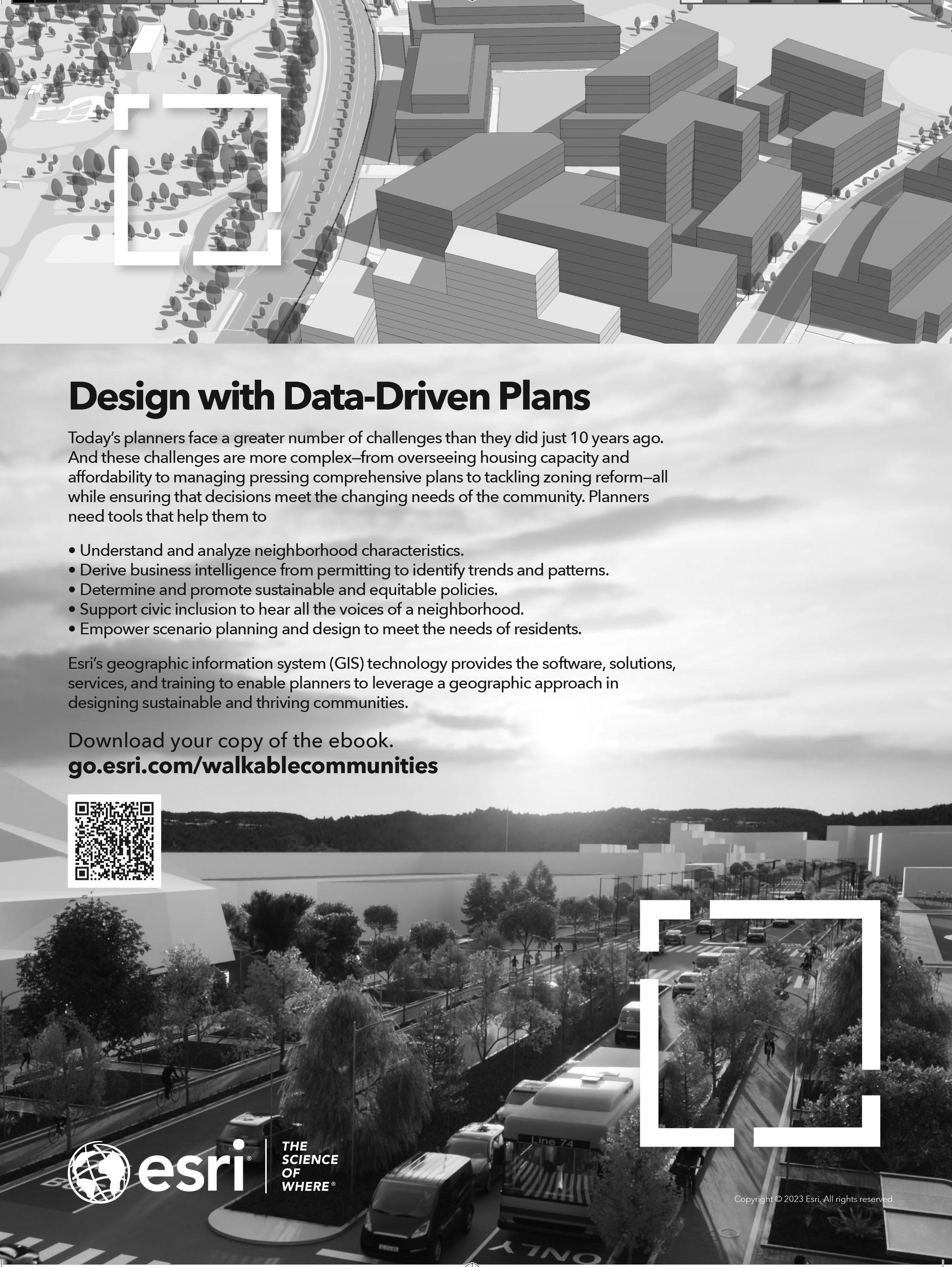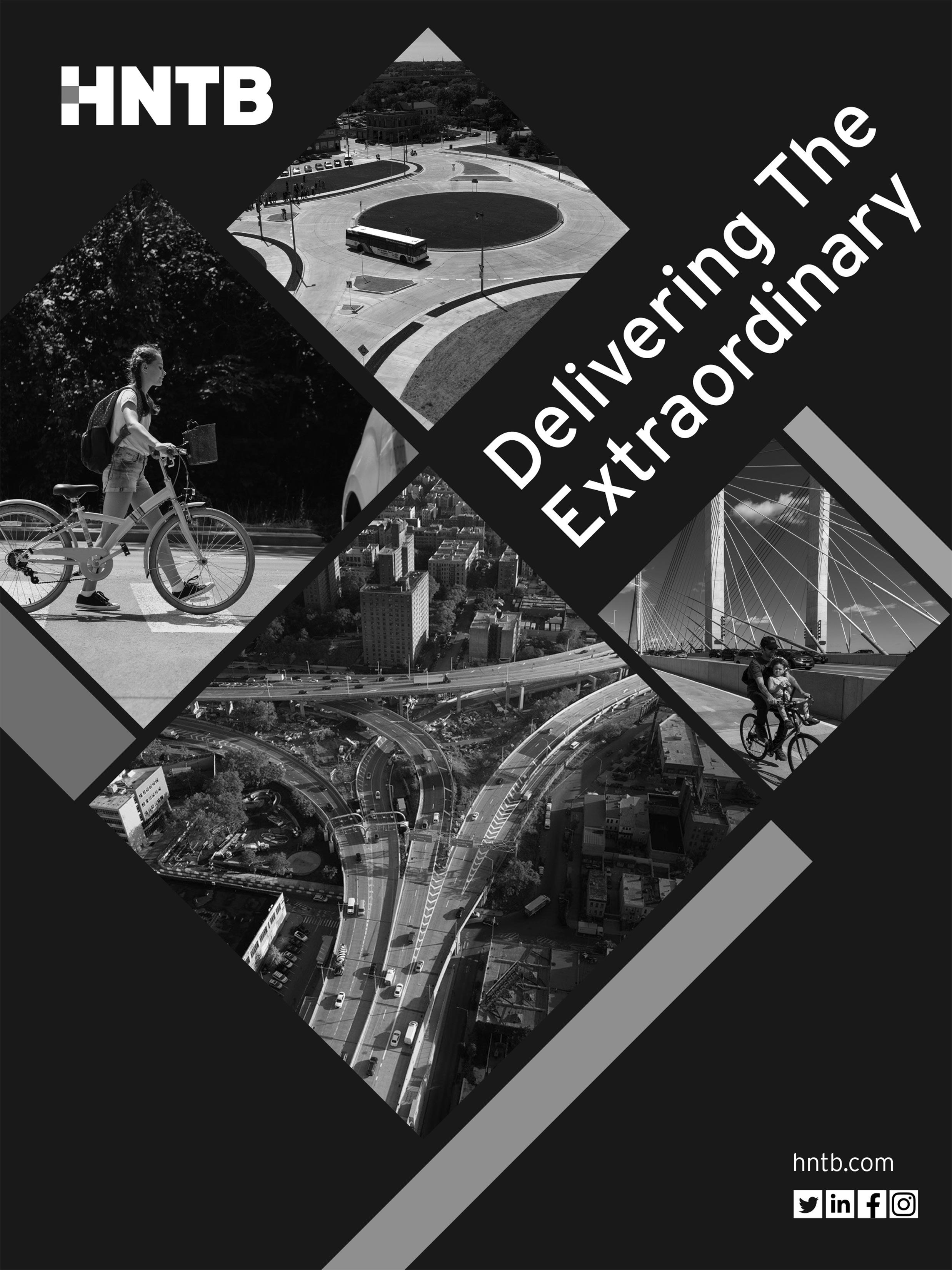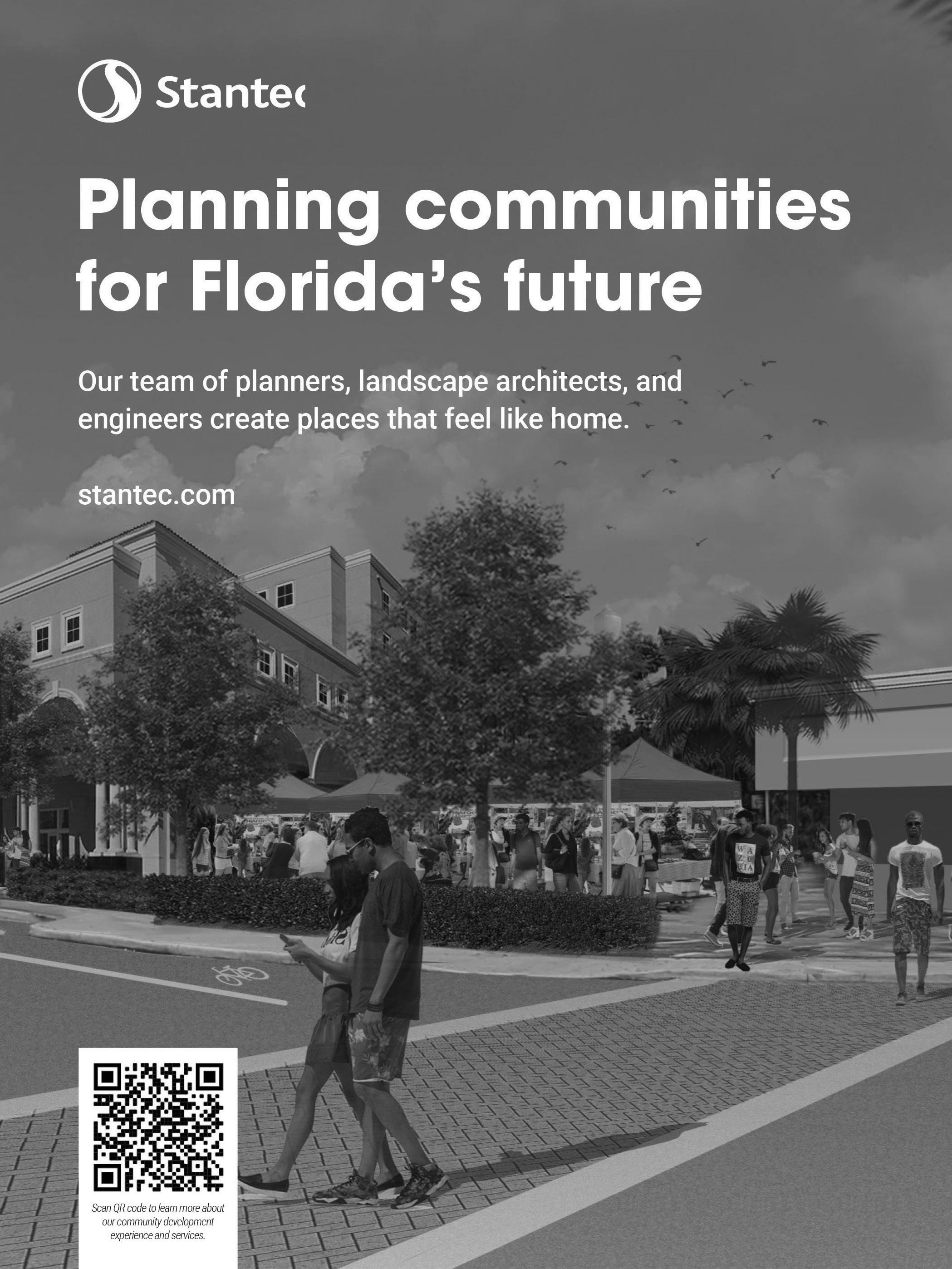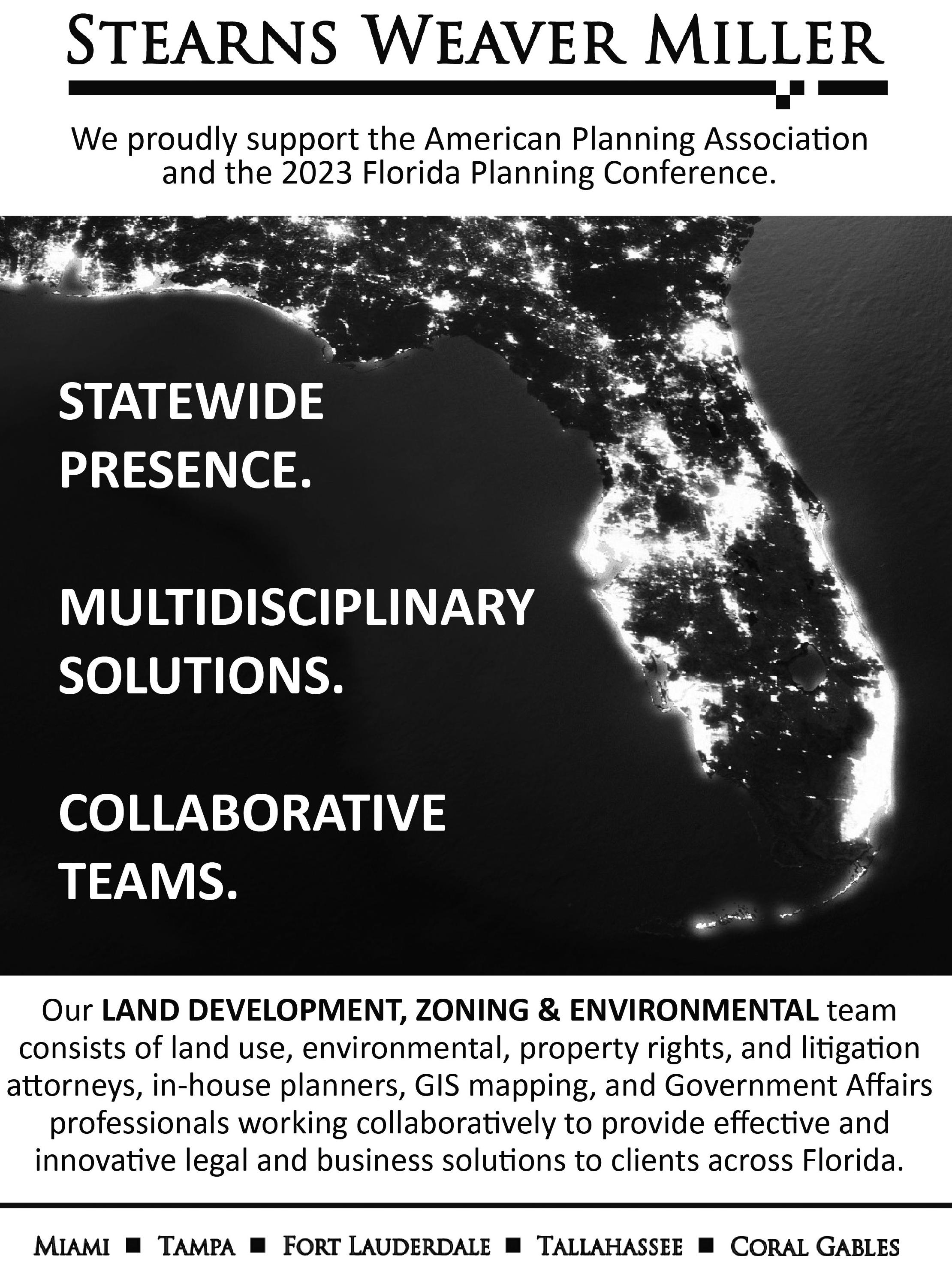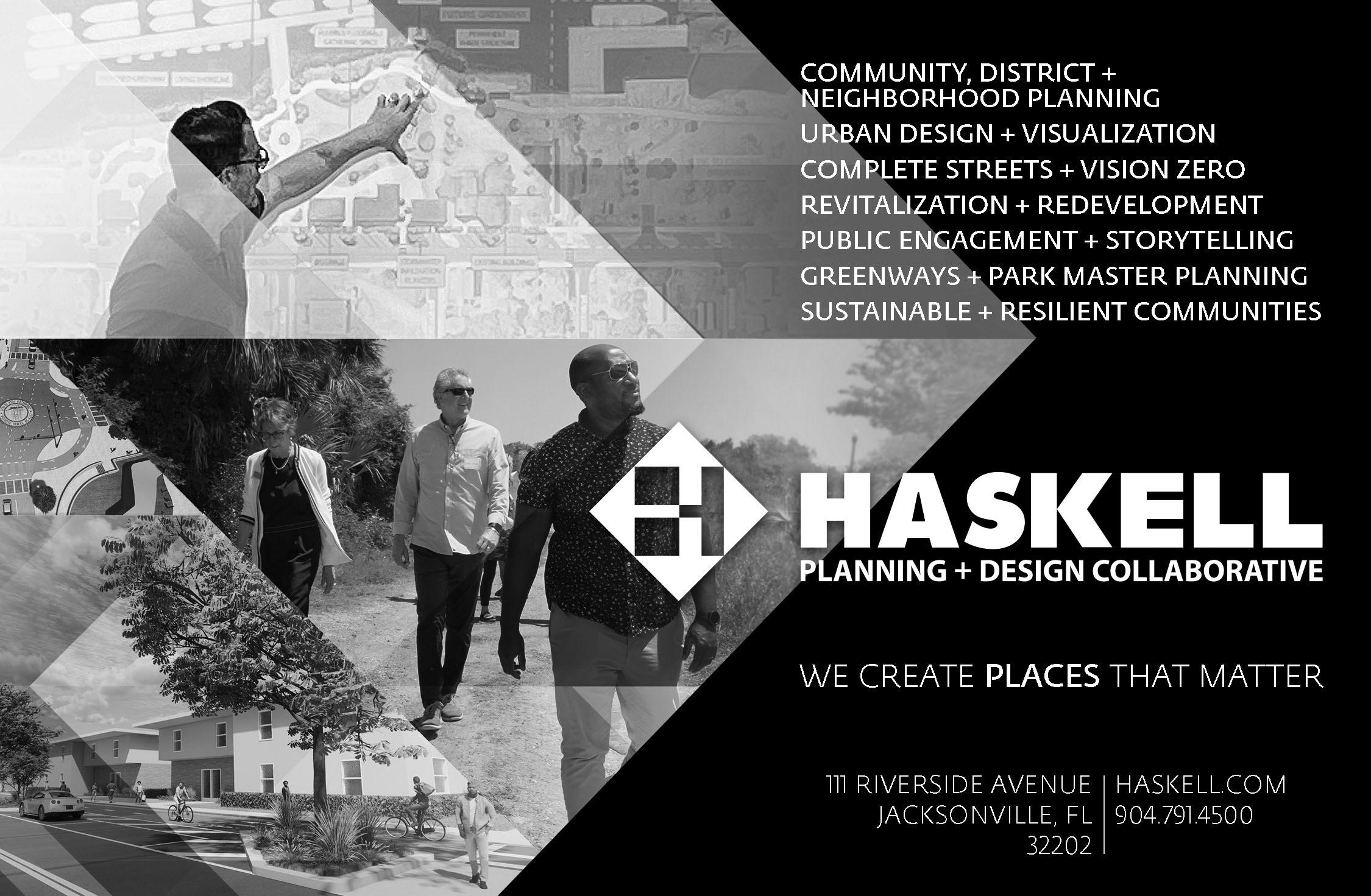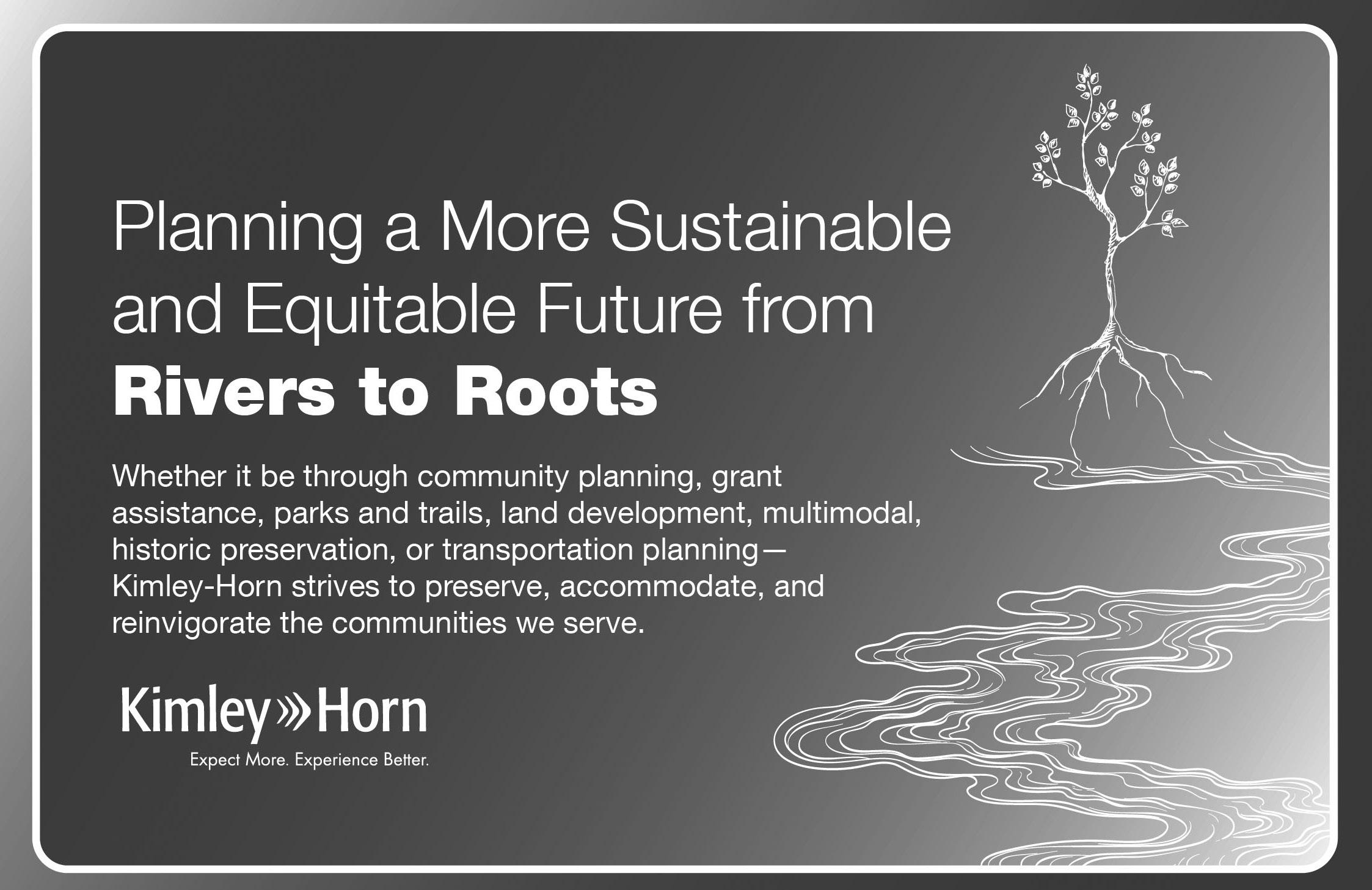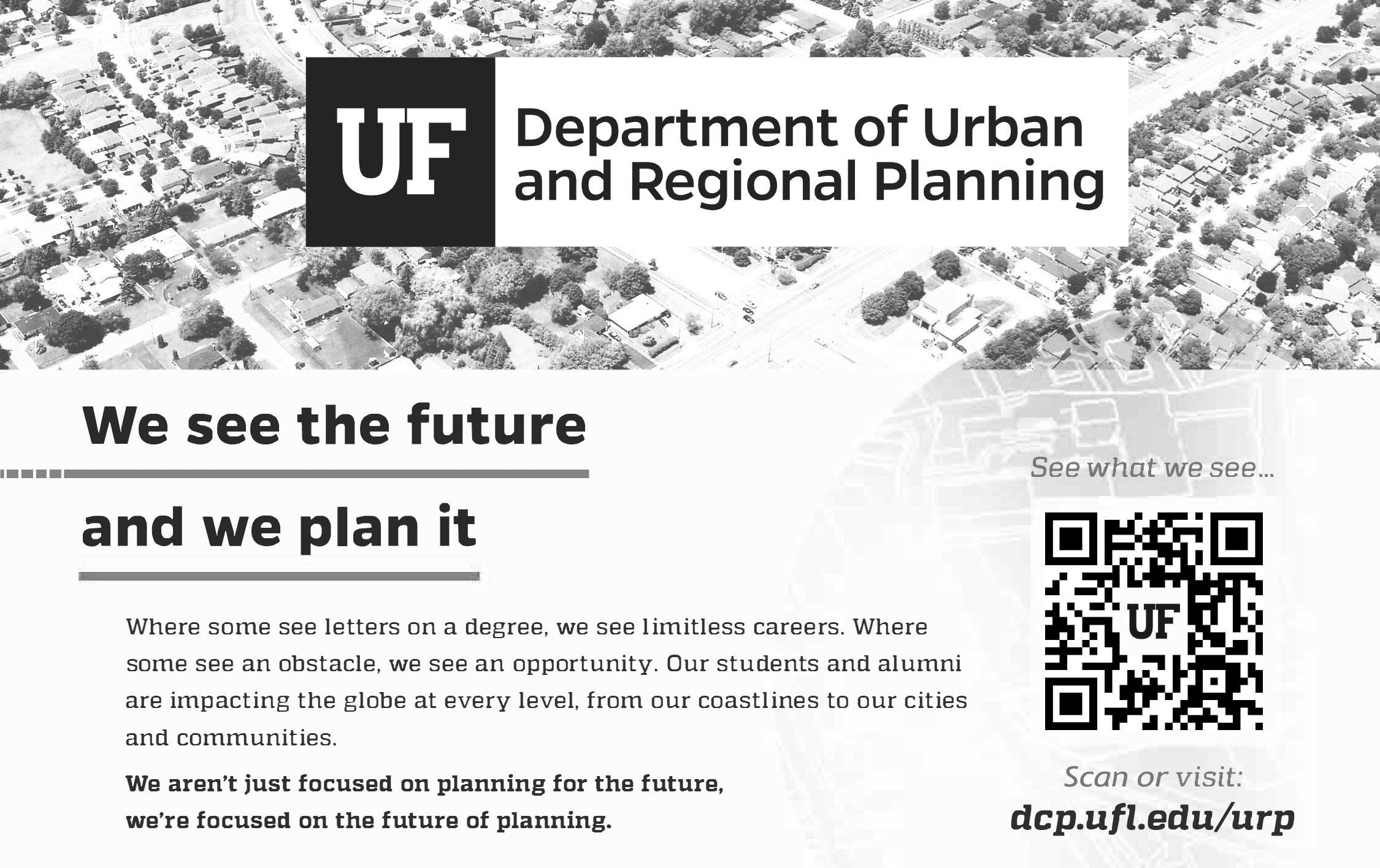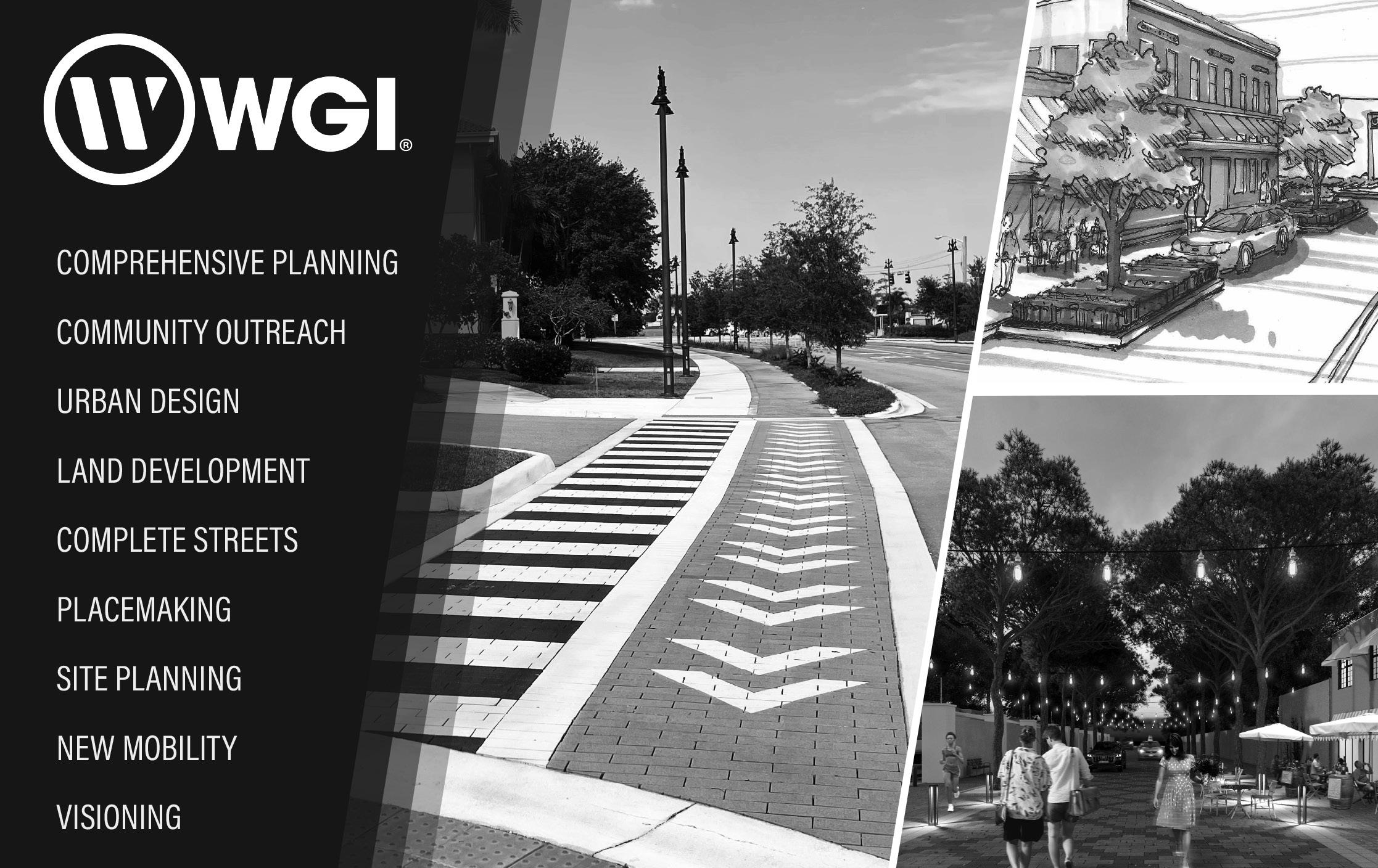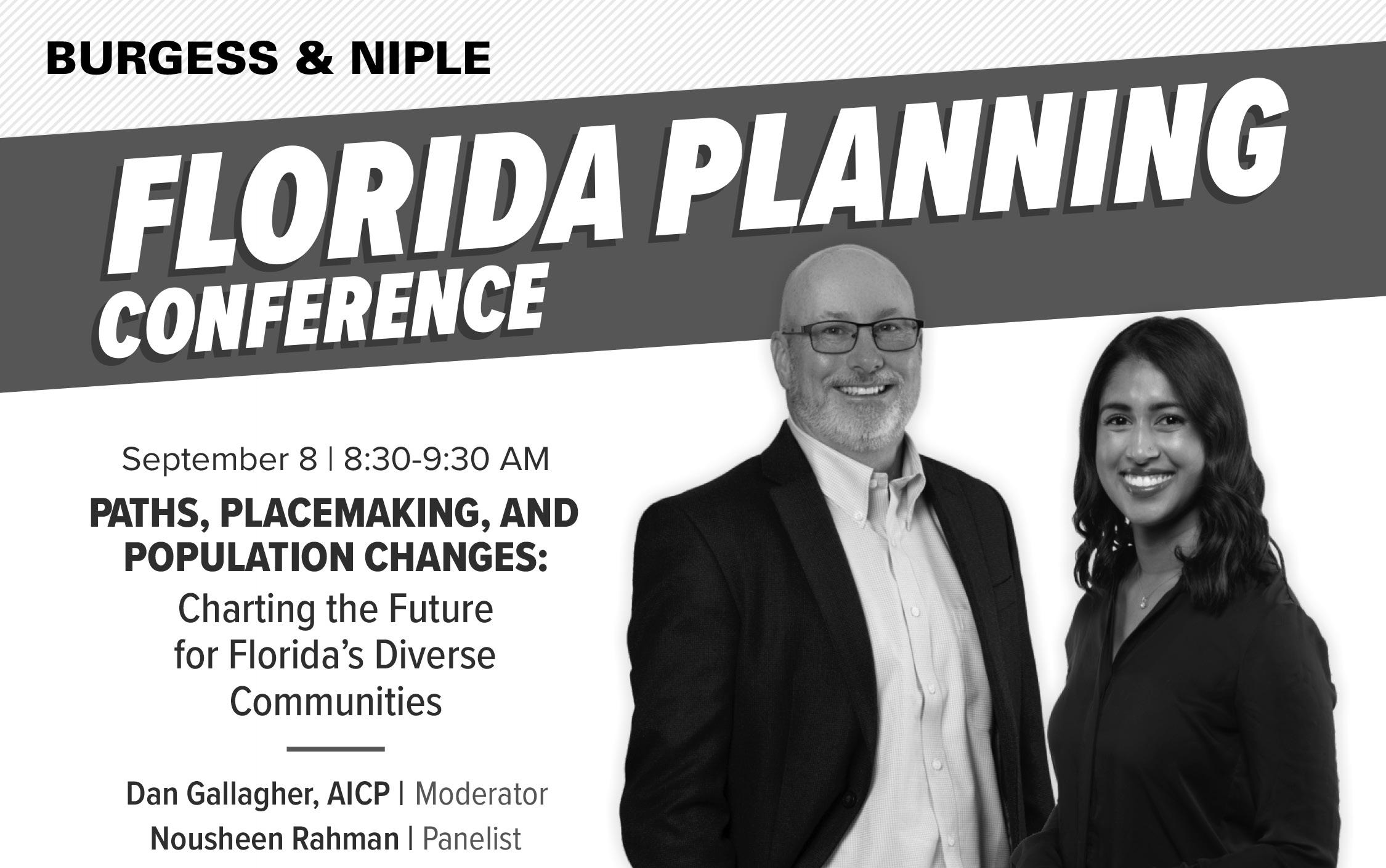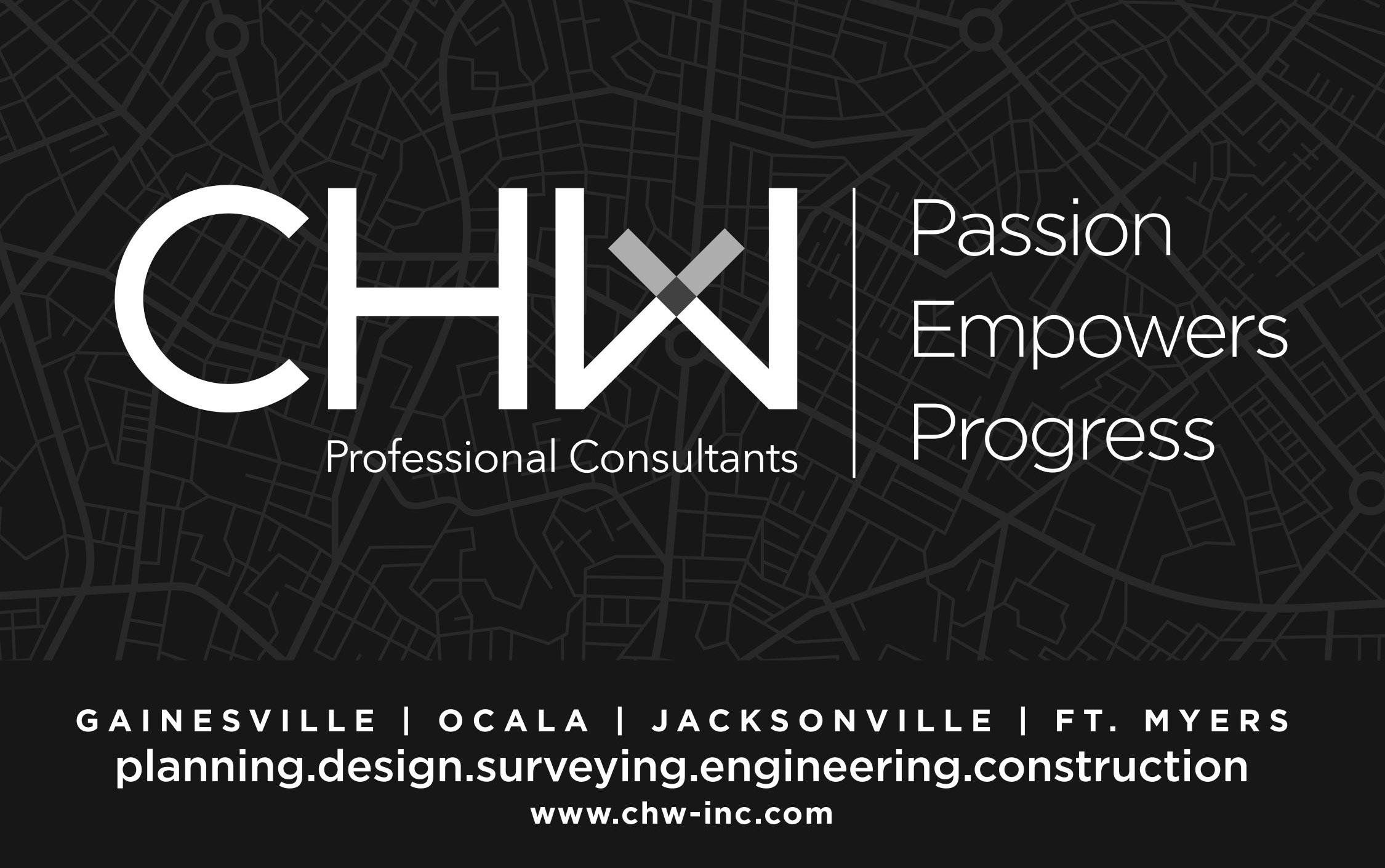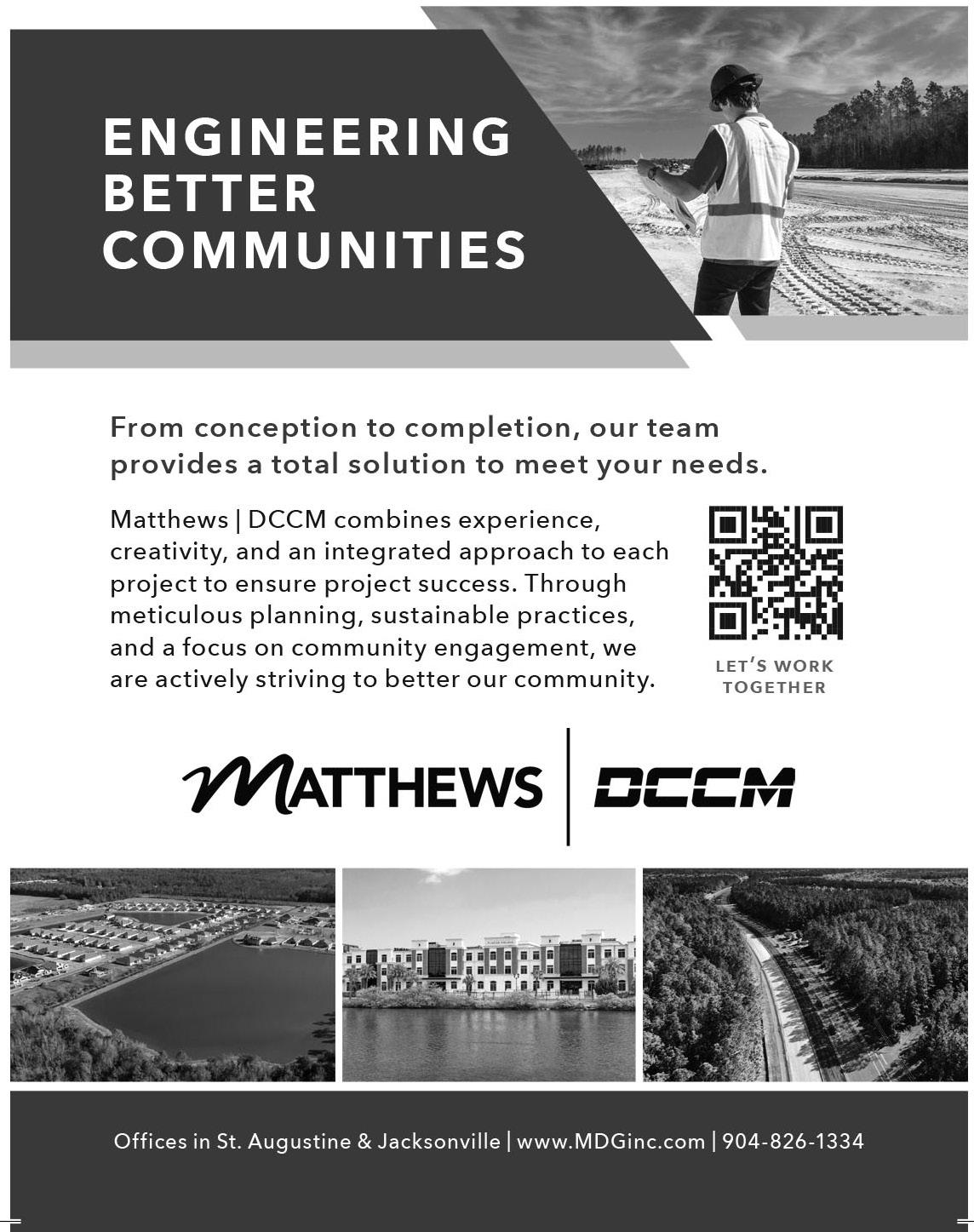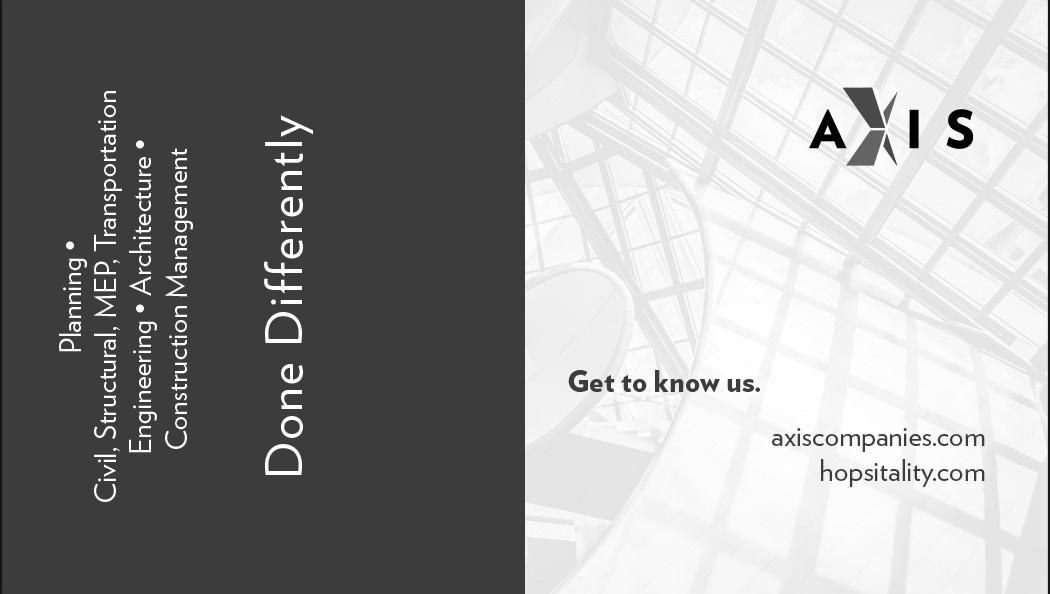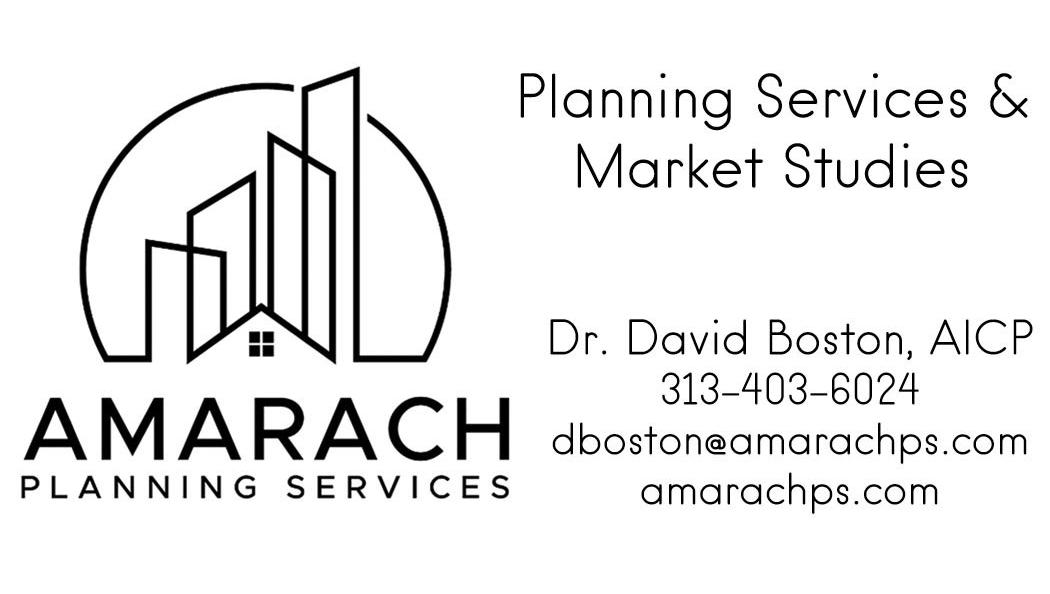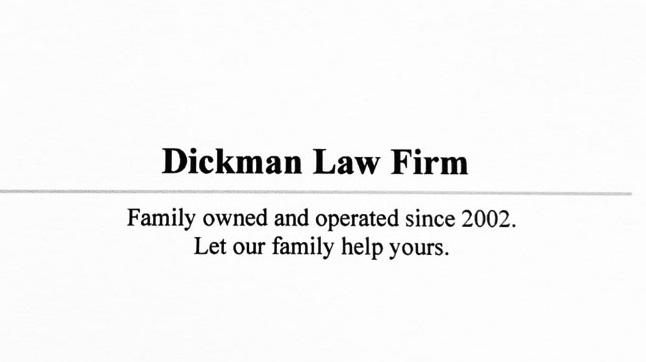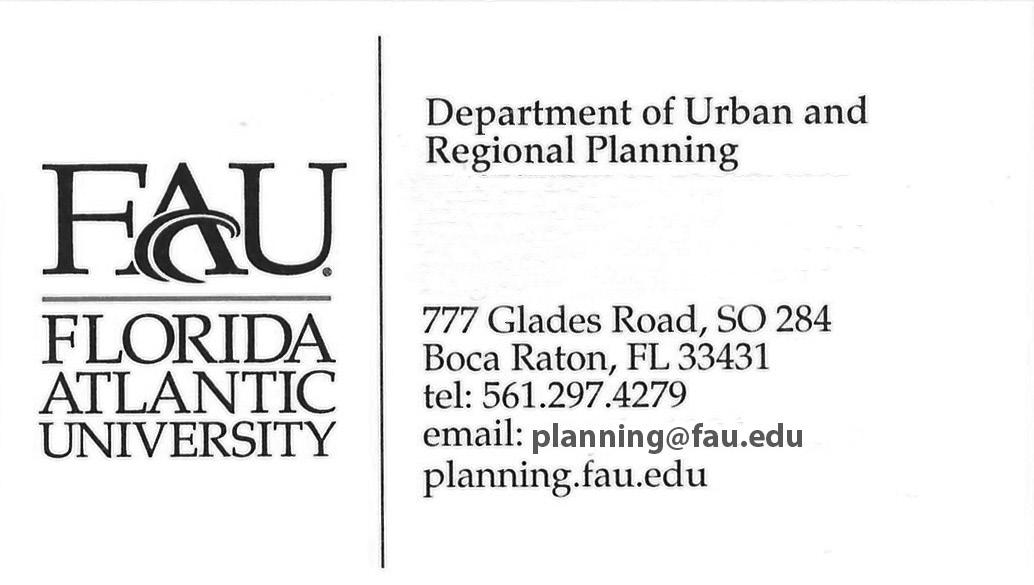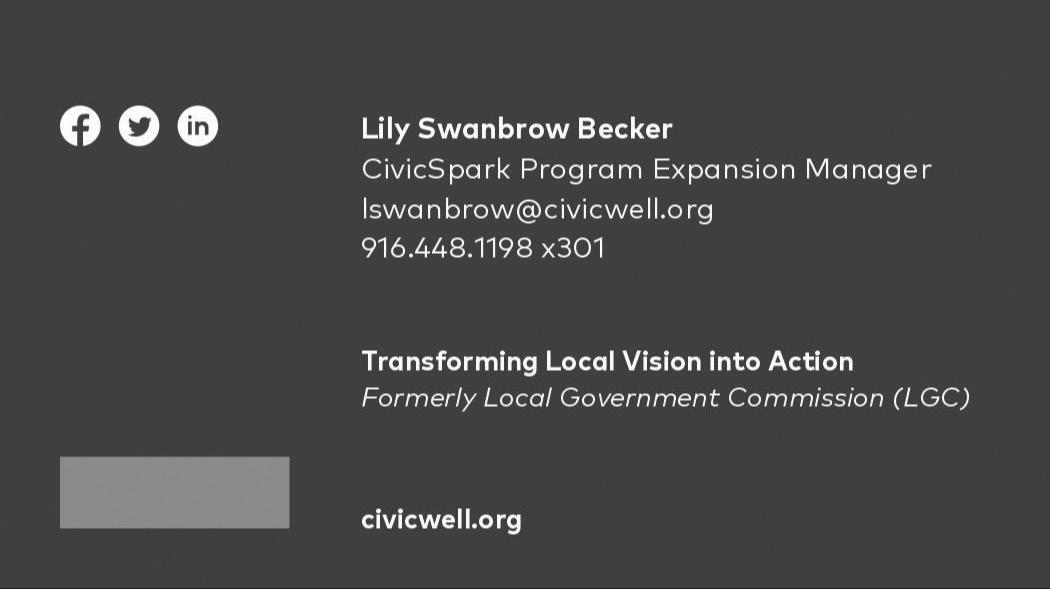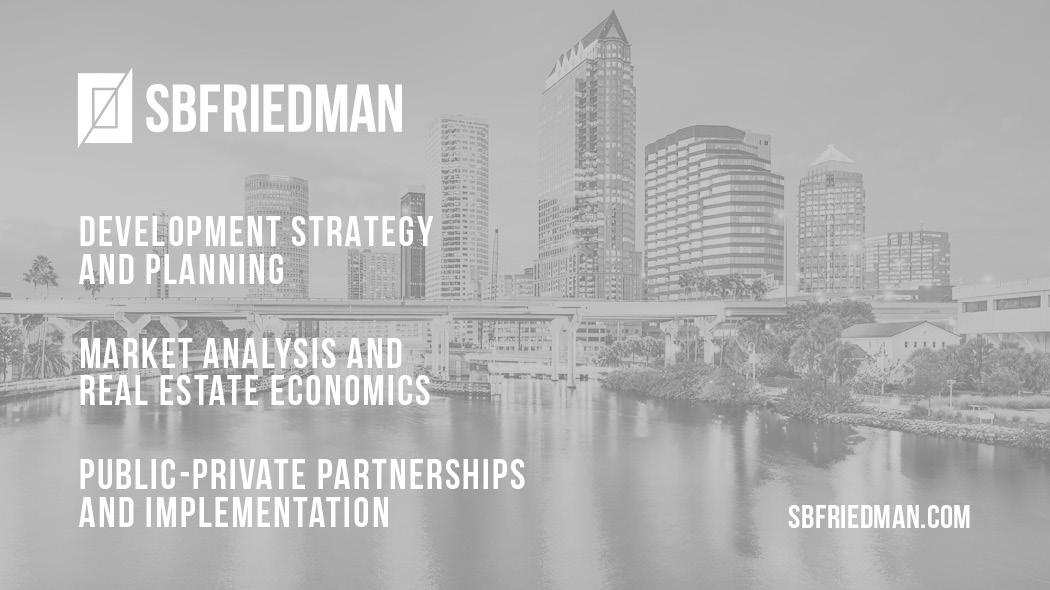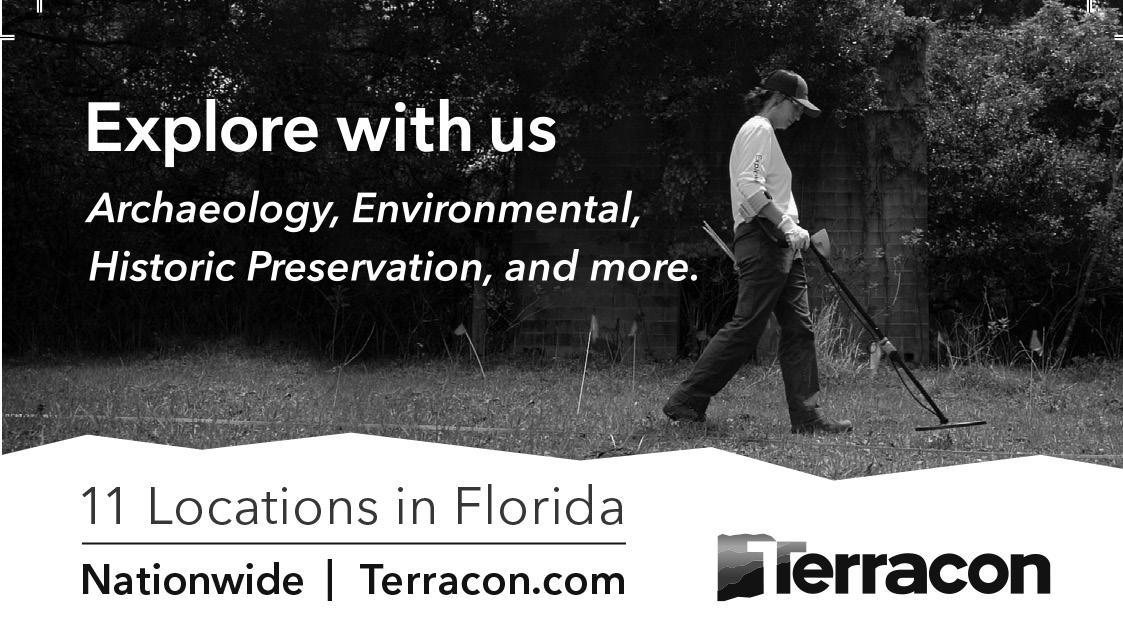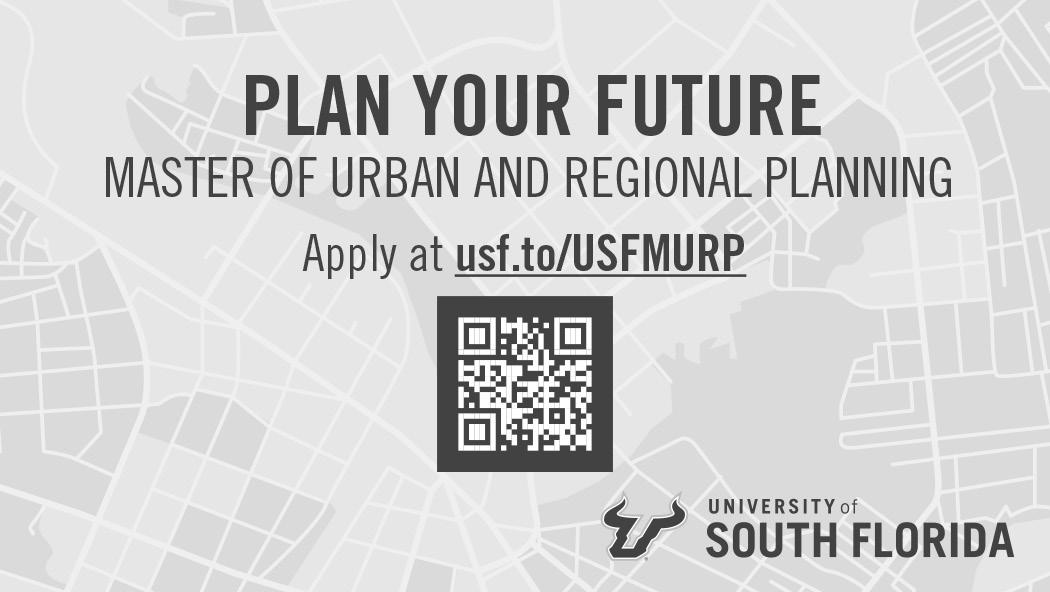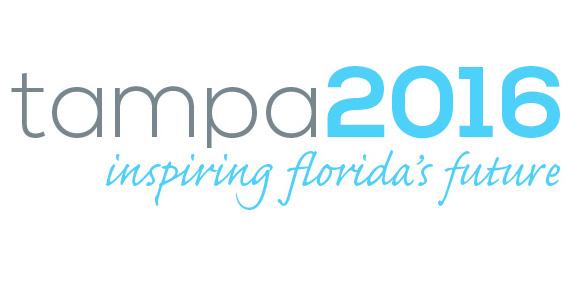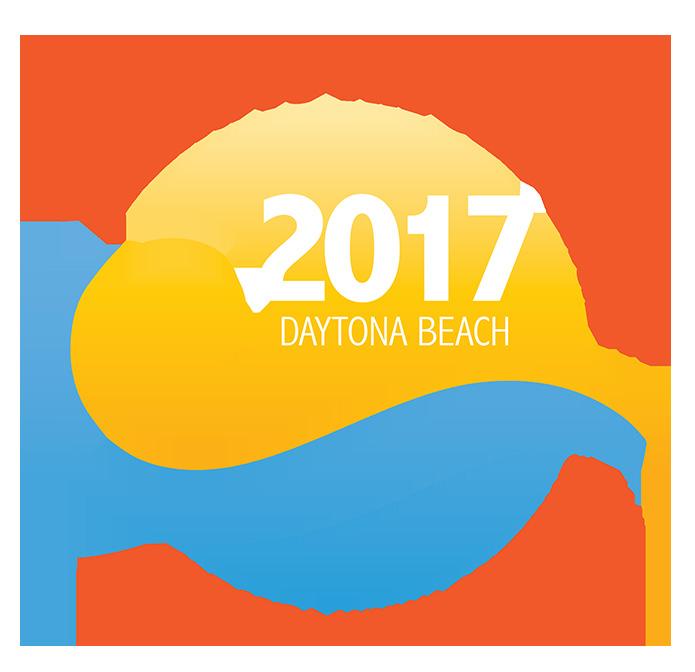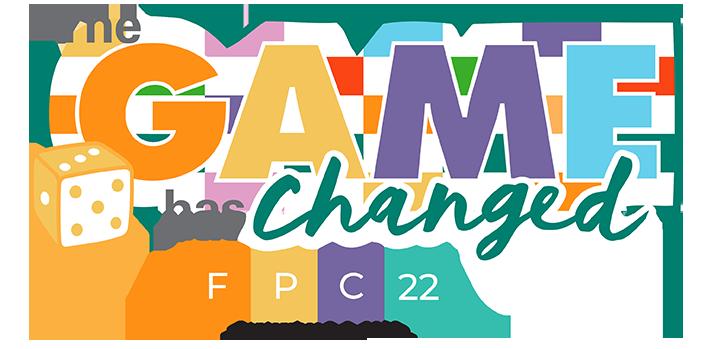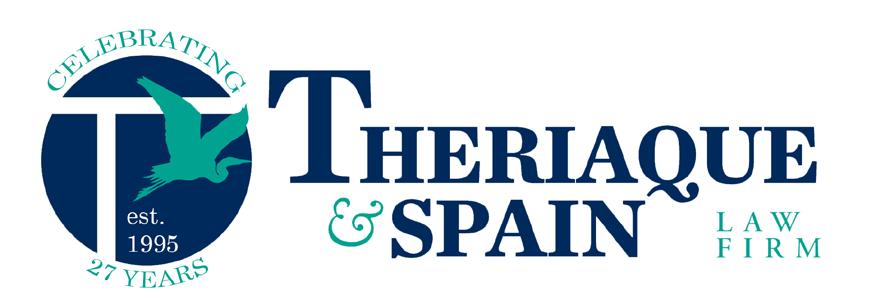
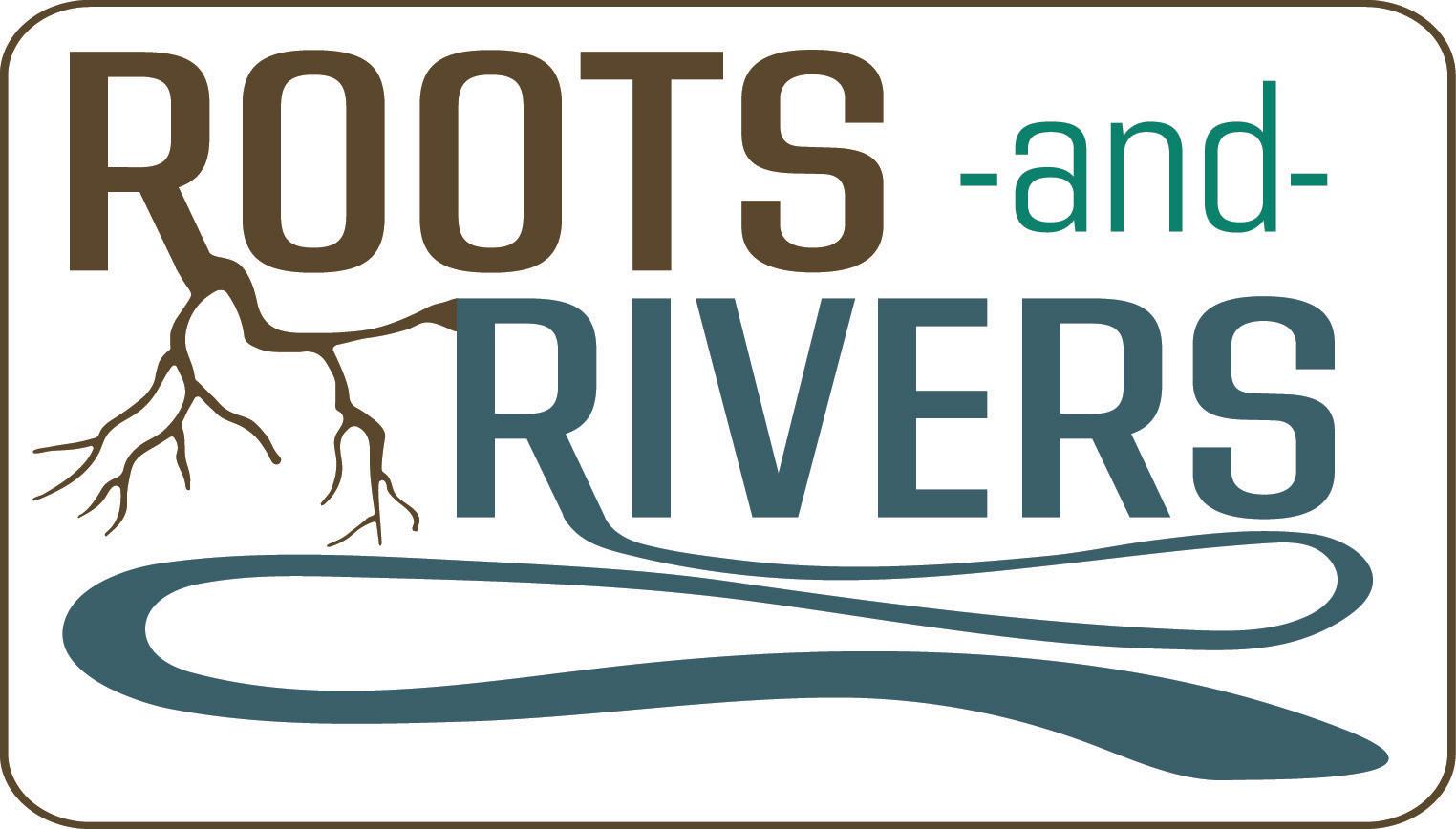





It’s been nearly a decade since the Florida Planning Conference was last held in Jacksonville; we are pleased to be back along the St. Johns Riverfront for the FPC23!

This year’s conference theme, Roots and Rivers, stems from Northeast Florida’s extensive roots in cultural and development history, including the Great Fire of 1901 in Jacksonville and the first Spanish Settlement in St. Augustine, as well as its position along the majestic St. Johns. As a play on words, the theme is not exclusive to Jacksonville as the State of Florida is home to many rivers and bodies of water, diverse topographies and state/federal parks, and deep cultural roots and history.
When I first moved to Florida in 1971, to Ormond Beach, my family made regular trips to Jacksonville to visit friends and take in the big city. Years later I often visited during my years at the University of Florida and then to attend Jacksonville Jaguars games. I’ve always loved its
neighborhoods and have long been fascinated by its industry and military presence.
The Northeast Florida region is dynamic and different than anywhere else in Florida.
The conference host committee has put together a diverse program that is sure to provoke thought and pique interest through a variety of sessions, mobile tours, preconference workshops, and receptions. Their dedication is admirable and they deserve all our gratitude. I’d also like to thank our numerous sponsors and exhibitors and encourage you to visit with many of them in the exhibit hall throughout the conference.
I look forward to catching up with you as we come together to learn and celebrate our profession!
Whit Blanton, FAICP APA Florida President
President Whit Blanton, FAICP
President-Elect
Allara Mills Gutcher, AICP
Immediate Past President Wiatt Bowers, AICP
VP Membership/Outreach
VP Section Affairs
VP Professional Development
VP Conference Services
VP Continuing Education
VP Communications
Secretary
Treasurer
Atlantic Coast
Broward
Capital Area
Emerald Coast
Ennis Davis, AICP
Ali Palmer
Henry Bittaker, FAICP
Eddie Ng, AICP
Lara Bouck, AICP, PE
Amy Elmore AICP
Jill Quigley, AICP
John Roach, AICP
Brad Parrish, AICP
Daniel Keester-O’Mills, AICP
Macy Falcon, AICP
Randy Woodruff, AICP
First Coast Ray Spofford, AICP, CNU-A
Gold Coast
Heart of Florida
Orlando Metro
Promised Lands
San Felasco
Sun Coast
Treasure Coast
OTHER
Student Representative
University Liaison
EPG Representative
Executive Director
Communications Manager
Admin. Assistant/Bookkeeper
Fabian De La Espriella, AICP
Laura Lockwood-Herrscher, AICP, CPM
Luis Nieves-Ruiz, FAICP
Jason Green, AICP
Juan Castillo
Katrina Corcoran, AICP
Kori Benton, AICP
Sabrina Viteri
Van Linkous, Ph.D.
Jarrell Smith
Casey Dendor, AICP, Conference Co-Chair
Catherine Koval, AICP, Conference Co-Chair
Wiatt Bowers, AICP, Conference Advisor
Daniel Ashworth, PLA, AICP, ASLA, Marketing and Sponsorships
April Bacchus, AICP, Logistics & Volunteers
Tyler Blair, PE, PTOE, PTP, Logistics & Volunteers
Noel P. Comeaux, AICP, PMP, Mobile Tours, Logistics & Volunteers
Ennis Davis, AICP, Mobile Tours & Logistics
Alyce Decker, AICP, Receptions
Janis Fleet, AICP, Sessions
Thalia Fuste, Receptions
Dan Gallagher, AICP, Sessions
Stephanie Gallagher, AICP, Sessions
Kelly Gibson, AICP, Logistics & Volunteers
Lindsay Haga, AICP, Mobile Tours
Fred Jones, AICP, Sessions
Blair Knighting, AICP, Receptions
Sean Lahav, MPA, Sessions
Dara Osher, AICP, Marketing & Sponsorships
Wiley Page, AICP, Logistics & Volunteers
Elizabeth Payne, AICP, Sessions & Receptions
Tony Robbins, AICP,
Deborah
Stephen
Stefanie Svisco
Patti Shea
Suzie Gray
Legislative Representative Lester Abberger
Communications Intern Tyler Hast
Conference Graphics Summer Taylor
The Florida Planning Conference is a professional development opportunity. Attendees are expected to act accordingly and maintain the dignity of the profession in their interactions with colleagues, students, volunteers and others at the conference. APA Florida strongly disapproves of any action or conduct by attendees or volunteers which can be construed to be inappropriate, harassment or intimidating. Conduct of this nature can result in an immediate request to leave the venue and the potential for not being allowed at future events. Anyone who has a concern should bring the issue to the attention of the APA Florida Executive Director or the designated Conference Liaisons, and can be reported confidentially. All concerns will be promptly handled.
The First Coast Section is pleased to host the 2023 Florida Planning Conference in Jacksonville on the St. Johns Riverfront!
We are excited to bring a dynamic list of plenary speakers to enlighten us about transportation, equity, and boosting local economies. Break-out sessions are assigned designated tracts that target specific planning areas and follow the theme of Florida’s first coast: Down to the Roots, Nature & Nurture, Seven Bridges, River to Sea, Standing Watch, and Changing Tides.
An intriguing set of mobile tours have been planned to take you on a journey around Northeast Florida as you choose from exciting options ranging from south St. Johns County with a visit to St. Augustine to the northern coast of Florida with a visit to the Villages of Mayport and Fernandina Beach. Several sessions
will meet the new Equity and Sustainability/ Resilience CM credits as well as the other muchneeded Law and Ethics CM credits.
Our pre-conference workshops will help you get in the mindset for the conference by encouraging planners to become leaders, educating us on planning for healthier communities, and planning cities for everyone. Receptions during the Downtown Art Walk and at The Jessie Ball duPont Center will provide the fun and socialization we need to close our day.
We hope you are ready to join us to learn about the latest challenges and planning practices while enjoying your First Coast experience!
FPC23 Co-Chairs
DOWN TO THE ROOTS: This track explores regulatory topics such as ethics, planning law, private property rights (climate change effects, case for eminent domain), and moratoriums. The track may also include other current conversation topics, such as short-term rental and sign regulations.

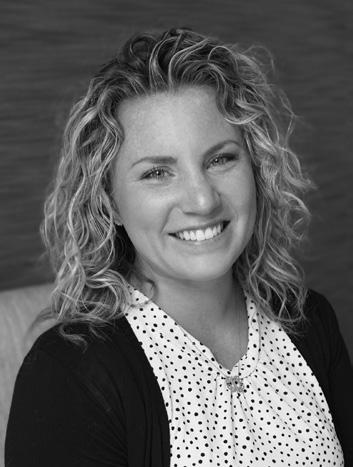
NATURE & NURTURE: This track describes innovative strategies for equitable and inclusive planning solutions, including but not limited to, age-friendly and legacy communities, school and transportation planning, community engagement, missing middle housing, and workforce housing.
SEVEN BRIDGES: This track centers on equitable and inclusive placemaking and redevelopment, mobility, infrastructure, complete streets, sustainable communities, and planning for increased population growth.
RIVER TO SEA: This track concentrates on community health and equity, park planning, wildlife corridors, resiliency, green infrastructure, environmental planning, and food policy. Emphasis should be placed on equitable and inclusive projects and solutions.
STANDING WATCH: This track focuses on facility and resiliency planning. Topics covered may include military planning, coastal planning, floodplain management, planning for natural disasters, and declaration of emergencies, and planning for schools and emergency services.
CHANGING TIDES: This track will zero in on land use, the use of geographic information systems (GIS), planning with new technology, technology solutions, and urban design and development, and floodplain management.
co:census
England-Thims & Miller, Inc.
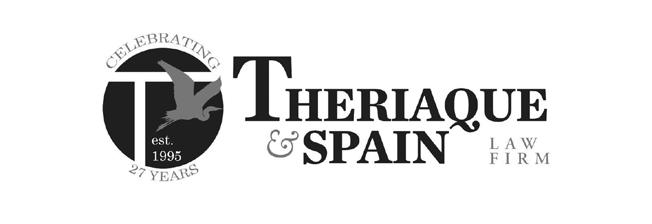
Esri
HNTB Corporation
Stantec
Stearns Weaver Miller
GOLD SPONSORS
Atkins
Benesch
Halff Associates, Inc.
Haskell
HDR
Kimley-Horn and Associates, Inc.
Metro Forecasting Models
University of Central Florida, School of Public Administration

University of Florida
VHB
Volkert, Inc.
WGI, Inc.

Burgess & Niple
Calvin, Giordano & Associates
CHW Professional Consultants
GAI Consultants | Community Solutions Group

Hole Montes, Inc.
Mathews| DCCM
Patel, Greene & Associates, LLC
StreetLight
Axis Infrastructure
Ayres Associates Inc

Dickman Law Firm
Driver, McAfee, Hawthorne & Diebenow
EXP
Florida Regional Councils Association (FRCA)
Forward Pinellas
Laura Turner Planning Services
North Florida TPO
SB Friedman Development Advisors, LLC
Terracon Consultants Inc.
Luke Transportation Engineering Consultants
TDW Land Planning
EXHIBITORS
Amarach Planning Services

Chen Moore & Associates
CivicSpark
Euna Solutions
EXP
FAU Urban and Regional Planning
Florida State University
Northeast Florida RPC
Safe Mobility for Life Coalition
The Brick Industry
UNICUS Rail and Consulting Services, LLC
University of South Florida
IN KIND
Virtual Review Assist

All breakout sessions and mobile workshops are approved for AICP CM credits as indicated. For AICP credits, use Event Number 9273600. Members of the Florida Bar should refer to The Florida Bar website to submit CLE credits. CM codes: SR = Sustainability & Resilience, EQ = Equity
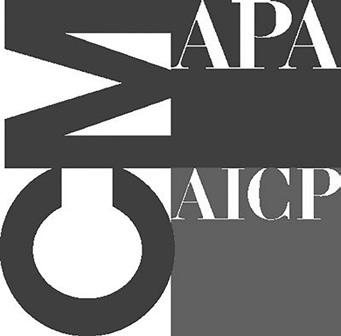
*Tours will meet in the Group Pick Up & Drop Off Area on the lower level. There will be signs to direct you to this location.

10am - 5pm l Credits: 7 CM
This mobile workshop will visit and discuss the planning efforts related to St. Augustine, the oldest continuously inhabited European-established settlement in the contiguous United States and several new master-planned communities in Jacksonville’s Southside and St. Johns County, the state’s fastest-growing county.

Master planned communities that will be visited during this mobile workshop include Seven Pines, eTown, Beachwalk, Palencia, and Nocatee. Located in northern St. Johns County, Nocatee is a 23.48-sqaure mile community master planned around a desire to transform the unique setting of the land into a place with an exceptional quality of living, while still preserving the area’s peaceful beauty. Home to 100 residents in 2008, Nocatee is the second fastest-growing master-planned community in the nation, with more than 20,000 residents today.
Next, visit the Nation’s Oldest City, St. Augustine, and learn how the original city plan served the Spanish residents and how Henry Flagler’s ambitious 19th-century development changed the city into what we know today. A box lunch and bottled water will be provided.
Casual attire, including comfortable shoes, a hat or visor, sunglasses, and sunscreen is recommended.
10am - 5pm l Credits: 7 CM
Visit the Isle of Eight Flags and engulf yourself in the Gullah Geechee Cultural Heritage Corridor while learning more about various planning initiatives underway throughout Nassau County. First, you will enjoy a guided tour of the City of Fernandina Beach’s rich history in its charming 55-block National Register Historic District, Amelia Island’s Victorian seaport village.
Next, the tour will travel to Old Town, platted by the Spanish in 1811 and dedicated in 2022 as one of 43 UNESCO documented U.S. Middle Passage arrival locations. The tour’s last stop on the island will be at the A.L. Lewis Museum at American Beach, a beach community established in 1935 by Florida’s first Black millionaire for African American vacationers once denied access to area beaches during segregation.
We’ll follow a scenic route back to the hotel, driving through Amelia Island, Big Talbot Island State Park, Little Talbot Island State Park, the National Park Service-managed Timucuan Ecological and Historic Preserve, and JaxPort. A box lunch and bottled water will be provided.
Casual attire, including comfortable shoes, a hat or visor, sunglasses, and sunscreen is recommended.
WEDNESDAY September 6
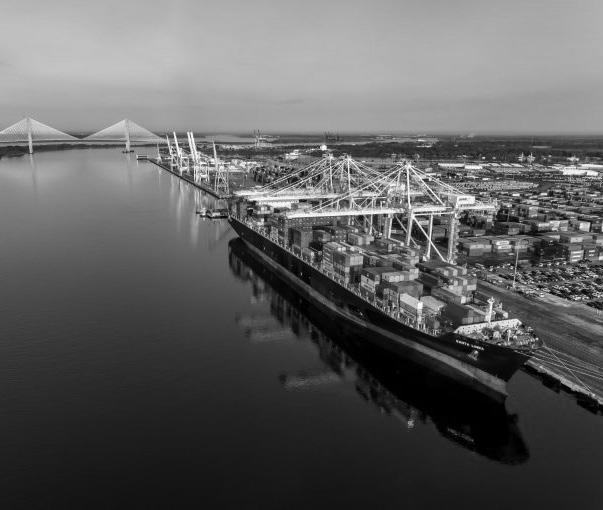
1 - 4pm l Credits: 3 CM
Travel back to 1562, and you would see Jean Ribault and his French Huguenots crossing a shallow sand bar into what is now called the St. Johns River. In 1565, English traders sailed into the mouth of the St. Johns and traded guns and ammunition for food and a vessel with the French Huguenots who had settled at Fort Caroline. This transaction was the first recorded act of international waterborne commerce in the New World; hence, Jacksonville is known as America’s First Port.
Today, the Port of Jacksonville is one of the largest deepwater facilities in Florida and one of the country’s largest vehicle import/export centers. This tour will offer a rare, behind-the-scenes visit to the Jacksonville Port Authority’s (JAXPORT) largest marine facility – Blount Island Marine Terminal. Originally known as Goat Island, the Blount Island Marine Terminal is a major focus of JAXPORT’s plans to become one of the Atlantic Coast’s largest container terminals and logistics hubs. All JAXPORT tour attendees must sign a liability waiver.
Casual attire, including comfortable shoes, a hat or visor, sunglasses, and sunscreen is recommended.
1 - 5pm l Credits: 4 CM
Explore two large walkable historic neighborhoods with unique shopping and dining options. Platted in 1869, the RiversideAvondale neighborhood is the largest nationally registered historic district in Florida. This neighborhood features an eclectic mix of architectural styles, as well as expanding commercial areas and numerous parks. Explore the new challenges facing these revitalized and thriving neighborhoods. Stops at key points in the neighborhood include the Five Points, Memorial Park, and the Shops of Avondale. Participants will then visit San Marco to observe various infill projects, infrastructure improvements, challenges, success stories, past planning, and current planning efforts. Once known as the City of South Jacksonville, San Marco is home to Jacksonville’s most successful 1920s Florida Land Boom development. The neighborhood continues to undergo significant infill redevelopment. The mobile workshop will include a guided walking tour of the neighborhood, discussing infrastructure improvements, challenges, success stories, past planning, and current planning efforts. The tour will include stops at key points in the neighborhood, including San Marco Square and Fletcher Park. Bottled water will be provided.
Casual attire, including comfortable shoes, a hat or visor, sunglasses, and sunscreen is recommended.
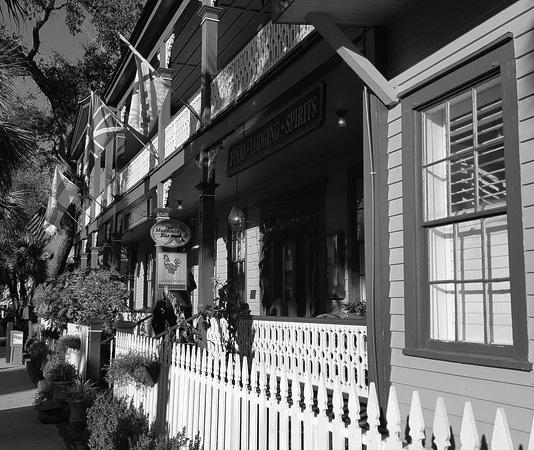
1 - 5pm l Credits: 4 CM
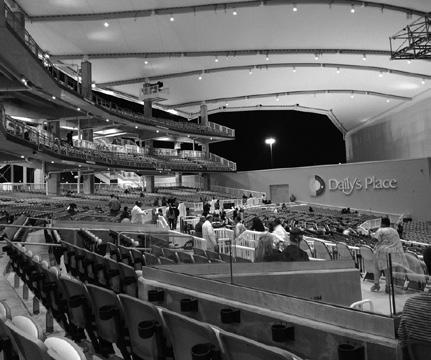
When the city of Jacksonville consolidated with Duval County in 1968, the cities of Jacksonville Beach, Atlantic Beach, and Neptune Beach voted to retain their own municipal governments. Along with historic Mayport Village, this community group is collectively called the Jacksonville Beaches. A peninsula until 1912, this 37-mile barrier island is home to a diverse collection of neighborhoods and communities, ranging from the resort community of Jacksonville Beach and Naval Station Mayport to the historic fishing village of Mayport.
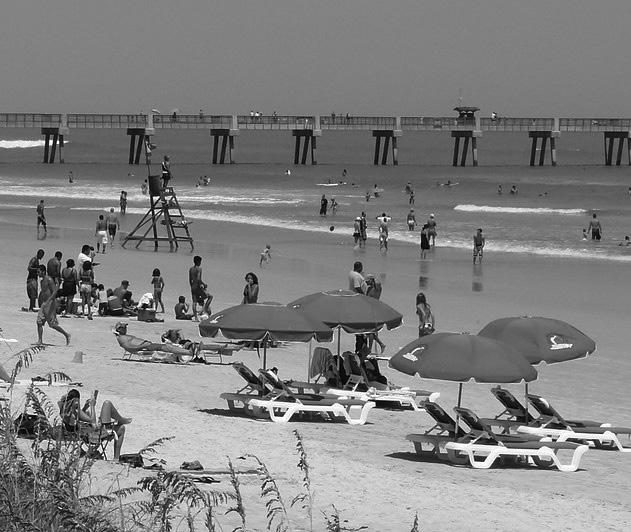
Today, the beach communities are addressing a multitude of challenges and opportunities, including addressing building height restrictions, downtown redevelopment, and the revitalization of a historic working waterfront village. This mobile workshop’s stops include Downtown Jacksonville Beach, Beaches Town Center, and Mayport Village. Bottled water will be provided.
Casual attire, including comfortable shoes, a hat or visor, sunglasses, and sunscreen is recommended.
THURSDAY September 7


8 - 11am l Credits: 3 CM
The St. Johns River is a major waterway in the State of Florida and a key landmark within Northeast Florida. The river is a multifaceted resource in the region. It provides recreation, habitat, water, and historical context and is a significant waterway for industry and the military as well as an expanding international port facility.
This water taxi tour will be narrated by the St. Johns Riverkeeper, an organization established to ensure a clean and healthy river for current and future generations. Guests will explore strategies being employed to advocate for a thriving St. Johns River Watershed that sustains healthy ecosystems for future generations.
The tour will take participants east and north of the city to look at historic sites, bridges, new waterfront developments, neighborhoods, and a public park only accessible by boat. Bottled water will be provided.
Casual attire, including comfortable shoes, a hat or visor, sunglasses, and sunscreen is recommended.
8am - noon l Credits: 4 CM
Growing out of LaVilla, Jacksonville’s oldest Gullah Geechee community, the birthplace of the Chitlin Circuit and the location of the first documented live performance of the blues in the country, Northwest Jacksonville is one of Florida’s largest and oldest urban African American districts. It is also home to the Emerald Trail and a focal point of JTA’s plans for an autonomous mass transit system.
An ambitious plan to link Jacksonville’s urban core neighborhoods, the Emerald Trail is a public/private partnership between the city of Jacksonville
and the nonprofit Groundwork Jacksonville. When completed in 2029, this signature outdoor destination will encompass approximately 30 miles of trails, greenways, and parks that encircle the urban core.
This mobile workshop will have various stops along recently completed and under construction portions of the Emerald Trail and McCoys Creek restoration projects. It will also include a tour of the new $60-million Jacksonville Regional Transportation Center (JRTC) and a presentation on JTA’s proposed U2C, an autonomous transit system that will link downtown with adjacent neighborhoods.
Along the way, the tour will visit cultural sites in Northwest Jacksonville, including a Negro Leagues baseball park and explore ongoing “withintrification” initiatives. In contrast to gentrification, “withintrification” refers to revitalization that’s driven by the people already in the neighborhood.
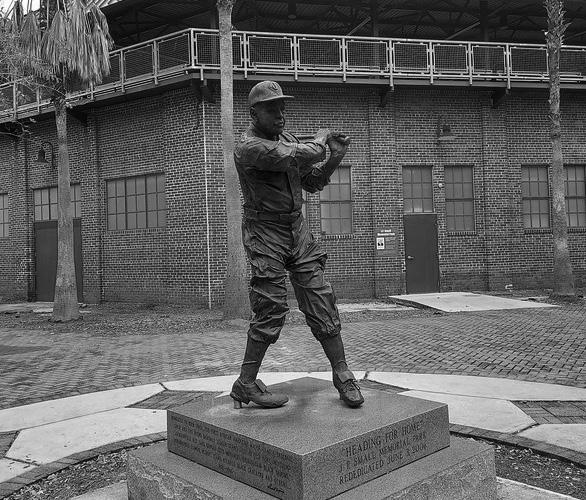
Casual attire, including comfortable shoes, a hat or visor, sunglasses, and sunscreen is recommended.
1:45 - 5:45pm l Credits: 4 CM
This mobile workshop will explore three popular adjacent urban districts with distinct challenges and opportunities. Home to some of the city’s best examples of historic architecture, Historic Springfield also boasts a thriving collection of locally owned small businesses and eateries. In recent years Springfield has experienced considerable change, including new development and the pressures of gentrification and displacement. The tour will explore the iconic neighborhood’s history and the trends shaping its future.
Originally a streetcar suburb and maritime industrial area, the Sports & Entertainment District is exploding with new development, ideas, and activity centered around its urban riverfront and the National Football League’s Jacksonville Jaguars franchise. Here, guests will experience a behind-the-scenes tour and discussion with Jaguars representatives about the ongoing and future NFL stadium renovations and ancillary urban mixed-use development projects.
Quickly settled by freedmen and women after the civil war, the Eastside is Jacksonville’s oldest intact reconstruction-era Gullah Geechee community. A stone’s throw from TIAA Bank Field, it’s also one of the city’s most walkable and architecturally unique areas. Here, we’ll learn and see several innovative strategies underway to address affordable housing, elimination of food desert status, protect cultural heritage and encourage economic development without displacement or loss of cultural heritage and sense of place.
Casual attire, including comfortable shoes, a hat or visor, sunglasses, and sunscreen is recommended.
1:45 - 5:45pm l Credits: 4 CM
Steamboats first appeared on the St. Johns River for the first time in the 1860s. During the next several decades, the St. Johns River became Florida’s first major tourist attraction for vacationing Northerners. By the mid-1880s, Sanford had become a pivotal distribution center due to the development of commercial steamboat service. The river became the state’s first “highway,” enabling homesteaders to move into the central part of the state. During this era, Green Cove Springs and Palatka emerged as important interior port cities along the river. Established in 1854 as White Sulfur Springs, Green Cove Springs
became the Clay County seat in 1871. Further south, Palatka was founded in 1821 and is the principal city of the Palatka Micropolitan Statistical Area.
Located across the river, the community of East Palatka was founded during the 1880s as an agricultural center along Henry Flagler’s Florida East Coast Railway and is the focus of the Chapter’s Community Assistance Planning Team (CPAT) pilot project. Stops include Spring Park in Downtown Green Cove Springs, Downtown Palatka, and East Palatka.
Bottled water will be provided. Casual attire, including comfortable shoes, a hat or visor, sunglasses, and sunscreen is recommended.
FRIDAY September 8
8 - 11am l Cost: $25
Seats: 30 l Credits: 3 CM
Thriving downtowns are the heartbeat of every major city worldwide, and Jacksonville is no different. A dynamic, pedestrianfriendly Downtown Jacksonville serves as a premier center for the arts, dining, retail, entertainment, business, and urban living in North Florida.

WEDNESDAY September 6

7:30 - 8am l Room: Boardroom 4
Leaders: Adrienne Burke, Lori Cox
Join us for a short yoga and mindfulness session that will nourish your body, mind, and soul. Our experienced instructors will guide you through brief practice, integrating breath, movement, and mindfulness. These sessions are designed to meet you where you are, support your personal growth, and offer a break from busy conference days. Join us as we explore the art of being present and cultivating a sense of inner calm. No experience or equipment is necessary.
THURSDAY September 7
7:30 - 8am l Room: Boardroom 4
Leader: Fatima Elkott
Discover the joy of movement as a break from the conference. This session welcomes everyone to join the groove. Unleash your inner dancer, break free, and immerse yourself in the magic of movement. Get ready to embrace the beat and unwind from conference stress in a judgment-free zone. No dance experience is needed!
Downtown Jacksonville dates to 1822, when Isaiah Hart established a settlement at the narrow point in the river where cattle crossed, known as Wacca Pilatka to the Seminole and the Cow Ford to the British. The crossing served the Old Kings Road that ran from St. Augustine to St. Mary’s, Georgia. On May 3, 1901, downtown was destroyed by the third largest urban fire in the country’s history, behind the Great Chicago Fire of 1871 and the 1906 San Francisco Earthquake. The aftermath led to the development of Florida’s first major early 20th-century central business district.
Over the years, the momentum to (re)develop Jacksonville has had many starts and stops. But, right now, downtown is on the doorstep of a significant change. Join Build Up Downtown as we walk through the urban core and learn about its unique history and projects under construction, in the pipeline, and proposed. Bottled water will be provided.
Casual attire, including comfortable shoes, a hat or visor, sunglasses, and sunscreen is recommended.
WED-FRI September 6-8
8am - 5pm l Room: Boardroom 4
Leaders: Adreinne Burke, Fatima Elkott, Sonide Simon
Did you know brain breaks can reduce stress, enhance creativity, increase focus, aid in memory and learning, and improve physical and mental health? Help vision and build your ideal community, share why you care about urban planning, or take a minute to color. Stop by any time during the conference to decompress, engage your creative side, or have fun with other planners. No artistic experience is required.
TUESDAY September 5
AICP EXAM TRAINING
10am - 5pm l Room: Grand 1
Cost: FREE
Gain an overview of the AICP exam, its content, and topic areas. In the morning, learn about successful strategies for applying to take the exam, how to address the five types of questions on the exam, and the abundant local, state, and national resources available to help you prepare for the exam. In the afternoon, gain training in several important exam topic areas (History/Law/Ethics), review past test takers’ comments, work on answering practice questions, and learn how to access the Florida Chapter study materials, including presentations, materials, and practice exams. Plenty of time will be available for your questions.
Speakers: Henry F. Bittaker, FAICP, APA Florida Executive Committee
Susan M. Coughanour, FAICP, APA Florida Treasure Coast Section
Peter Henn, AICP, JD, Florida Atlantic University
PUBLIC SPACES: SLEEP AT HOME. LIVE OUTSIDE
2 - 5pm l Room: Grand 3
Credits: 3 CM
When people ask me about an ideal city, I reply that one where I’d like to sleep at home but to live outside. This means that it should have quality and quality parks, a citywide park system. Infrastructure is important, but also uses and activities, and programs. Streets are the biggest public space in cities, but they are usually, not friendly to people of all ages and abilities. Sidewalks might be the most important infrastructure, where people meet, develop a sense of belonging. - Gil
This class will include the elements to create great parks and other public spaces, their benefits, and how to create change.
Speakers: Gil Penalosa, Chair 8 80 Cities
APA FLORIDA EXECUTIVE COMMITTEE MEETING
1:30 - 4:30pm l Room: St. Johns
The APA Florida Executive Committee will conduct its regular meeting. All members are invited to observe.
6 - 6:30pm l Room: Grand 3
The 2023 Annual Member Meeting will be held at the Hyatt Regency Jacksonville Riverfront from 6 – 6:30 pm on Sept. 5 in room Ballroom 3. At this meeting, members will be asked to VOTE on:
2024 Budget | Budget Narrative
2024 Strategic Operational Plan
2024 Legislative Mission, Guiding Principles, and Policy Positions
PLANNER TO LEADER: A MID-CAREER BOOTCAMP
10am - 1pm l Room: Grand 3
Cost: $25 l Credits: 3 CM
The APA Florida Chapter’s Equity, Diversity, and Inclusion (EDI) Committee will be hosting a pre-conference workshop at the Florida Planning Conference to help diverse mid-career planners achieve leadership positions and professional growth.
The workshop will feature Florida’s planning leaders, directors, and managers with diverse backgrounds providing strategies, resources, and reflections to help attendees advance in their careers.
Speakers: John Cooper, City of Rockledge
Brad Cornelius, AICP, CFM, CPM, Wade Trim, Inc.
Alexis Crespo, AICP, RVi Planning + Landscape Architecture
Amy Elmore, AICP, EXP
Paula N. C. McMichael, AICP, City of Sanibel
Allara Mills Gutcher, AICP, the planning collaborative
Mary Moskowitz, AICP, Seminole County
Leslie Olson, AICP, District Planning Group
Claudia Ray, GAI Consultants, Inc
Pete Sechler, GAI Community Solutions Group
Susan Swift, AICP, Boggs Engineering LLC
Heather M. Urwiller, AICP, CFM, City of Minneola
Melissa E. Zornitta, FAICP, Hillsborough County CityCounty Planning Commission
Every two years, the Chapter President appoints a Bylaws Committee, chaired by the Chapter Secretary, to review the Bylaws and identify any changes needed for consistency with national APA bylaws or Chapter practices and policies. In addition to the proposed changes listed below, other minor wording and formatting revisions are proposed throughout to improve grammar and clarity.
The proposed bylaws amendments require approval by a majority of those chapter members voting. Voting ends Sept. 21. All members will receive an electronic notice with the link to cast a ballot.
If you have not already done so, use the QR code to cast your vote or go to bit.ly/2023apaflbylaws

WEDNESDAY Opening Plenary & Project Awards
CITIES FOR EVERYONE – AFFORDABLE, EQUITABLE, SUSTAINABLE
Gil Penalosa, Founder & Chair 8 80 Cities

8:30 - 10:15am l Grand 4 & 5 l 1 CM credit
Gil Penalosa is the Founder and Chair of the successful Canadian non-profit organization 8 80 Cities and the Founder of Cities for Everyone. He also leads a private international consulting firm, Gil Penalosa & Associates, providing services as an inspirational keynote speaker, instructor of Master Classes, and advisor to decision-makers in communities.
In his conversation, Cities for Everyone – Affordable, Equitable, Sustainable, Gil will discuss our “Post-COVID” world and that, with climate challenges and explosive population growth, how we plan and manage cities is radically different.
THURSDAY Keynote Lunch
GROWING ECONOMIES IN SMALLER CITIES
Ilana Preuss, Founder & CEO Recast Your City
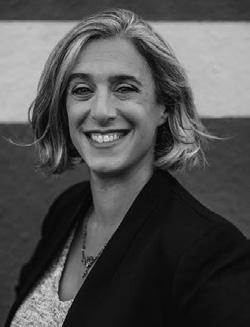
Noon - 1:40pm l Grand 4 & 5 | 1 CM credit
Ilana Preuss is a leading expert on growing the economies of smaller cities and neighborhoods that have been left behind, and there has never been a better time to build businesses and thriving places in those communities. Ilana will discuss Growing Economies in Smaller Cities by bringing smallscale manufacturing into downtowns and neighborhood main streets as a way to create vibrant places that people love, while building stronger local economies.
FRIDAY Closing Plenary & Chapter Awards
CREATING SPACES FOR CHILDREN IN CITIES: AN APPROACH TO CHILD FRIENDLY URBAN DESIGN PRINCIPLES
Aminah Ricks, Founder, Future Planners
10:45am - 12:30pm l Grand 4 & 5 | 1 CM credit
Aminah Ricks is an architect, urbanist, writer, and teacher. She is also the founder of Future Planners, which fosters awareness and engagement of children in the practice and promise of urban planning. Aminah will discuss and educate on the importance of including a child-friendly design approach to improving cities.

TUESDAY September 5
Opening Reception
6:30 - 8pm l Hyatt Regency Jacksonville River Deck
The opening reception will be held at the conference hotel, the Hyatt Regency Jacksonville Riverfront, on the River Deck overlooking the scenic St Johns River and downtown Jacksonville.
Appetizers and one beverage included. Cash bar available.
WEDNESDAY September 6
8 - 8:30am l Room: Clearwater
Grab your breakfast to go and your business cards to chat about how you can be a part of the organizational efforts to start a statewide Women and Planning Group under the National APA Division of Women and Planning. Let’s meet up and talk about organizing to support one another and grow the careers of women in the planning profession!
5:30 - 6:30pm l Room: Grand 3
Join Florida APA’s Equity, Diversity, and Inclusion (EDI) Committee for an informal meet and greet. Engage members and listen to their experiences and accomplishments serving on the committee. Network with other planners and discover how you can become a member and work towards achieving equity, diversity, and inclusion in the planning profession and our communities.

First Wednesday Art Walk Reception
6 - 9pm l Downtown Jacksonville
The Wednesday evening event will be held in conjunction with Jacksonville’s First Wednesday Art Walk. Participants will be able to explore the Downtown Northbank urban core, discover local businesses, and experience the area’s public art and the work of local artists and musicians. Explore three major hubs: James Weldon Johnson Park, The Jessie (duPont Center), and Melanin Market at The Breezeway at Vystar Tower, and all the businesses and public art in between.
Students & EPG Reception
8 - 10pm l Ruby Beach Brewing
Join the Emerging Planners Group for the annual reception at Ruby Beach Brewing. The EPG strives to be a resource for entry and mid-level planners. Our goals are to connect future and emerging planners to each other and more experienced planners. The EPG provides professional development, networking, and leadership opportunities, as well as outreach and community service activities.
THURSDAY September 7
Rooted in History Reception
6 - 8pm l The Jessie Ball duPont Center
40 East Adams Street
The final reception on Thursday evening will take place at the Jessie Ball duPont Center in the heart of downtown Jacksonville, just a few blocks from the conference hotel. “The Jessie” is a nonprofit complex and adaptive reuse of the main branch of the Jacksonville Public Library system, originally built in 1965. Appetizers and one beverage included. Cash bar available.
Everyone needs a place to live, but housing affordability and attainability is a pressing issue for many Floridians.
APA Florida is proud to both showcase our local planner’s work in affordable housing and to partner with the Florida Housing Coalition to bring best practices and an understanding of the evolving housing affordability and attainability landscape in Florida, ranging from neigh borhood plans to the Live Local Act. Check out the below as we deep dive into solving a vital need for our state!
TUESDAY, SEPTEMBER 5
• 5 - 6 pm. The Live Local Act: Planning for Affordable Housing
WEDNESDAY, SEPTEMBER 6
• 10:30 - 11:30 am. Unlocking Affordable Housing in West Coconut Grove: A Comprehensive Blueprint for Going Forward
• 10:30 - 11:30 am. Transit & Affordable Housing: First FTA HOPE Grant in Florida
• Noon - 1 pm. Creating Affordable Housing and Resilient Community Land Trusts
• 1:30 - 2:30 pm. The Game of Zones
THURSDAY, SEPTEMBER 7
• 9:45 - 10:45 am. The Live Local Act: ‘Let Them Eat Cake’ and the Local Government Toolbox Response
FRIDAY, SEPTEMBER 8
• 8:30 - 9:30 am. Integrating Mobility Focused Land Use, Zoning Reform, and Housing Policy in Tampa Bay
• 9:45 - 10:45 am. Affordable Housing: The Wicked Math Problem
From mobile workshops to breakout sessions, get a deeper dive into the roots of our host city and Florida’s First Coast:
— MOBILE TOURS—
TUESDAY, SEPTEMBER 5
• 10 am - 4 pm. Fernandina Beach, Amelia Island and the Timucuan Preserve ($)
• 10 am - 4 pm. St. Augustine and Master Planned Communities ($)
WEDNESDAY, SEPTEMBER 6
• 1 - 5pm.The Beaches Communities: Mayport, Atlantic Beach, Neptune Beach, and Jacksonville Beach ($)
• 1 - 5pm. JAXPORT: Behind the Scenes ($)
• 1 - 5pm. Riverside/Avondale & San Marco ($)
THURSDAY, SEPTEMBER 7
• 8 - 11am. Jacksonville’s Original Superhighway: The St. Johns River ($)
• 8 am - noon. Emerald Trail, Black History, and Withintrification ($)
• 1:45 - 5:45pm. The River Towns of Northeast Florida ($)
• 1:45 - 5:45pm. The Sports District, Historic Springfield and Eastside ($)
FRIDAY, SEPTEMBER 8
• 8 - 11am. Downtown Redevelopment Tour ($)
— BREAKOUT SESSIONS —
WEDNESDAY, SEPTEMBER 6
• 10:30 - 11:30am. Quality Over Quantity: Say Goodbye to Level of Service and Hello to Safer Streets for All! (St. Augustine)
• 1:30 - 2:30pm. Blueprint for Success: Blue Zones Project Jacksonville
• 1:30 - 2:30pm. Planning with Gullah Geechee Descendant Communities. (First Coast)
THURSDAY, SEPTEMBER 7
• 11 am - noon. What Lies Beneath: Equitable Planning for Historic Cemeteries In Your Community (Jacksonville)
• 1:45 - 2:45pm. Our Nation’s Oldest City to Become our Nation’s Smartest City (St. Augustine)
• 4:30 - 5:30pm. Trails Tales (First Coast)
Get an early taste of FPC24 in Tampa, as we explore how we as a community are Building Bridges, Connecting Communities.
WEDNESDAY, SEPTEMBER 6
• Noon - 1 pm. Shaping Tampa’s Tomorrow: Transforming the Conversation
• 2:45 - 3:45pm. Safe Access to Parks and Schools from Planning to Funding (Tampa/Hillsborough)
• 2:45 - 3:45pm. Live, Grow, Thrive 2045: Updating Tampa’s Comprehensive Plan for a Vibrant and Inclusive Future
THURSDAY, SEPTEMBER 7
• Noon - 1 pm. Shaping Tampa’s Tomorrow: Transforming the Conversation
• 2:45 - 3:45pm. Safe Access to Parks and Schools from Planning to Funding (Tampa/Hillsborough)
• 2:45 - 3:45pm. Live, Grow, Thrive 2045: Updating Tampa’s Comprehensive Plan for a Vibrant and Inclusive Future
FRIDAY, SEPTEMBER 8
• 8:30 - 9:30am. Enhancing Resiliency and Mitigating Vulnerability in Sarasota-Manatee Region
• 8:30 - 9:30am. Paths, Placemaking, and Population Changes: Charting the Future for Florida’s Diverse Communities (Tampa Bay)
Starting out on your career?
Desiring a change?
Got that new position and want to develop those hard and soft skills?
FPC 23 is the place to be! Check out what APA Florida and this conference can do to advance your career!
Looking for a new headshot to renew your resume? Look no further! Join us at Room F (next to registration) at the following times for a free session with a professional photographer!
• Wednesday 11 am – 1 pm
• Thursday 9:30 – 1130 am
Dress to slay professionally! First Come, First Served.
Match that new headshot (or not) with a shiny resume upgrade! Sit with volunteer planning peers who have served in public or private sectors as planning managers, hiring managers, or key personal on staff interview panels to review your resume. Sign up at Registration and bring your resume. Timeslots will be allocated first come, first serve.
Looking for that next dream gig? Trying to find your next star on staff? Check out our job bulletin board located on the Expo Floor throughout the conference!
Whether you’re starting out or a seasoned professional looking for new perspective, join these sessions to learn from your peers on workplace and career advancement, and critical hard and soft skills that will help you advance!
TUESDAY, SEPTEMBER 5
• 10 am - 1 pm. Planner to Leader: A Mid-Career Bootcamp ($)
WEDNESDAY, SEPTEMBER 6
• Noon - 1 pm. Attracting and Retaining Talent in a Tight Labor Market
• Noon - 1 pm. An Interactive, Multigenerational Conversation: Blaming It All on Boomers and Millennials … And Other Things We Shouldn’t Do In Workplace Dynamics and Community Planning
• Noon - 1 pm. Equity, Diversity, and Inclusion (EDI) Forum
• 2:45 - 3:45 pm. The Planner Hero’s Journey: Combating Imposter Syndrome
THURSDAY, SEPTEMBER 7
• 8:15 - 9:15 am. Listen Up! Do You Listen to Respond or Understand?
• 8:15 - 9:15 am. Storytelling: Not Your Average Bedtime Story
• 8:15 - 9:15 am. AI Enhancing Planners
• 9:45 - 10:45 am. Planting Strong Roots: Effective Project Scoping, Solicitation, and Proposal Practices
• 1:45 - 2:45 pm. Workplaces for All Abilities
• 4:30 - 5:30 pm. Professional Eye-Candy: What are Those Certifications?
Make sure you stop by on Wednesday at noon for judging for our inaugural Student Poster Competition & Session!
The posters will be on display during the conference, so be sure to swing by and check out all the amazing research from these future planning superstars! The winner will be announced during the Friday’s Closing Brunch.
Trying to earn your AICP? Need a boost? Look no further! The AICP Exam Prep session will provide training in several important exam topic areas (History/Law/Ethics), and provide a place with likeminded peers seeking to explore successful strategies for applying to take the exam.
Tuesday, Sept. 5 l 10 am – 5 pm l Grand 1
We can’t wait to see you at the 2024 Florida Planning Conference from Sept. 3 - 6 in Tampa! This is the first time this area has hosted the conference since 2016, and we have so many things to show you: from dynamic Water Street and Armature Works in downtown Tampa, to the Midtown mixed-use development in West Tampa, to the recently redeveloped St. Pete Pier in downtown St. Pete, and more. Don’t miss this opportunity to see the transformation of Florida’s Gulf Coast for yourself.

As we move into 2024, we are updating our sponsorship packet with more options and opportunities for your our valued collaborators! Stay tuned for a brand new sponsorship packet to debut by the close of 2023. We thank you for your continued support and look forward to these new opportunities to come.
To provide a better experience for the conference host committee and potential session presenters, we are permanently moving up the call for panel proposals. For FPC24, we will open the session proposal applications on Dec. 4 and run through Feb. 16. Details coming soon!
This year, we are proud to introduce free headshots and an enhanced resume review, along with our inaugural student poster session! Stay tuned as well as we explore additional options to enhance your conference experience next year! Suggestions are always welcome to the Vice President of Conference Services, Eddie Ng, at bit.ly/VP-FPC
Nurses represent the largest segment of the healthcare workforce, are considered the most trustworthy of all professions, and play a significant role on the frontlines of care in our schools, hospitals, community health centers, long-term care facilities, and other places. Therefore, their perspective and influence should be present at decision-making tables. These are the women and men we need to shape policy and our communities, as their experiences and sacrifices can help mitigate or stop future catastrophes and have a unique insight into communities, and the residents in them, that can give planners a fresh viewpoint on how to build healthier, more inclusive communities for all ages and abilities.
The Nurses on Boards Coalition (NOBC) represents national and state efforts by nurses and others working to build healthier communities in America. Their mission is to improve the health of communities and the nation through the service of nurses on boards and other bodies. AARP Florida and the NOBC are working together to integrate the health planning perspective through the volunteer citizen participation of practicing nurses into the local planning processes. To achieve this, AARP Florida and NOBC are collaborating to demonstrate the value nurses can bring to local decision-making and to identify local government boards and committees that could benefit from the unique skills and perspective nurses bring to create opportunities for healthy community planning.
Laurie Benson, RN, Nurses on Boards Coalition
Laura Cantwell, AARP Florida
Denise McNulty, DNP, MSN, RN, APRN, PMH-BC, Collier County Nurses
The Live Local Act marked a new era in how the Florida Legislature approaches affordable housing policy with its combination of funding, land use strategies, tax incentives, and other tools. This workshop will focus on the act’s new land use tool for developments that set aside at least 40 percent of its housing as affordable in commercial, industrial, and mixed-use areas.
This interactive workshop will explore the Live Local Act’s effects on local land use planning, how communities can make the most of the act to drive housing production, and what comes next for state and local affordable housing land use policy.
Ali Ankudowich, AICP, Florida Housing Coalition
Kody Glazer, Esq., Florida Housing Coalition
Thomas Ingram, Esq., Sodl & Ingram PLLC
Grand 1
Transit & Affordable Housing: First FTA HOPE Grant in Florida
The session will provide an overview of the efforts to conduct an IdeaFest funded by the USDOT/ Federal Transit Administration through a Helping Obtain Prosperity for Everyone (HOPE) Grant. This is the first and only HOPE Grant that will help residents in Putnam County, a designated rural county, reach better paying jobs via transit in the greater Jacksonville region. Stakeholders include the county, Rideshare (the only public transit provider in the county), and the Palatka Housing Authority, a highly successful local provider.
Matamron Bacon, Northeast Florida RPC
Noel Comeaux, AICP, PMP, Northeast Florida RPC Clayton Levins, Smart North Florida Clayton Anthony Woods, Ph.D., Palatka Housing Authority
Grand 2
The Ethics of Big Data: Balancing Opportunity and Responsibility
Big data has become a buzzword in the world of technology and business, including planning and transportation. With massive amounts of data generated every day, there is a growing need and desire to analyze and use this information to guide decisions, drive innovation, and increase efficiency. However, as the use of big data continues to evolve it is important to understand real and perceived privacy concerns, bias within Big Data, and when to leverage Big Data within the planning industry.
Whit Blanton, FAICP, Forward Pinellas
Nick Meyers, GISP, StreetLight Data
Grand 3
Unlocking Affordable Housing in West Coconut Grove: A Comprehensive Blueprint for Going Forward
The West Coconut Grove Affordable Housing Blueprint offers guidance on modifying policies and legislation to incentivize affordable housing in the West Grove neighborhood in Miami, along with case studies and assistance programs to prevent displacement of current residents. Recommendations are based on current conditions for creating affordable housing requiring calibrations and modifications to keep up with changing local and regional socioeconomic conditions. These improvements grant families in West Grove economic mobility while allowing them to maintain their homes without being cost-burdened.
Kevin Crowder, CEcD, BusinessFlare
Juan Mullerat, APA, Plusurbia
Eddie Ng, AICP, The Corradino Group
Collier County Rural Lands Stewardship Area (RLSA) was approved in 2002. Over the next 17 years, only one project was approved (Town of Ave Maria). However, since 2019, four new villages have been approved, and a new town is in the works. Learn about this program, which balances private property rights with public policy initiatives, including protection of listed species habitat, protection/enhancement of historic flowways, reduction in vehicle miles traveled, and increasing stock of affordable housing, all at no cost to current taxpayers. This session will specifically focus on the recently approved 681.5-acre mixed-use Brightshore Village Stewardship Receiving Area.
Nick Casalanguida, Barron Collier Companies
Jessica Harrelson, AICP, Peninsula Engineering
Bob Mulhere, FAICP, Hole Montes, Inc.
Christopher O. Scott, AICP, LEED AP, Peninsula Engineering
Ellen L. Summers, AICP, Hole Montes, Inc.
Grand 7
Crossing the Bridge of Lions into the Historic Old Town of St. Augustine will soon serve as a fitting analogy that illustrates the transition that occurs from emphasizing the movement of cars to the movement of people as part of a holistic approach to mobility planning for all. The transition started with amendments to the guiding vision of the city: its comprehensive plan. The citys journey continued with its Mobility Plan and Mobility Fee adoption. Come learn more about its real-world implementation and find out if a proposed prohibition of paid parking surface lots was approved!
Reuben Franklin, PE, City of St. Augustine
Jonathan Paul, AICP, NUE Urban Concepts, LLC
Lauren Rushing, NUE Urban Concepts, LLC
Amy Skinner, AICP, City of St. Augustine
Grand 8
This session focuses on the legal and planning aspects of resiliency for sea level rise and climate change, including technical approaches, liability for planning (or not planning), floodplain management, housing and shoreline case studies. Important to these efforts is the ability to identify and navigate and develop new policy and tie efforts to other programs that leverage benefits, such as FEMA’s Community Rating System. The panel will identify numerous aspects of resiliency planning and present specific examples of how to
identify, approach and resolve the legal, technical, and policy aspects of planning for future flood risk.
Erin Deady, AICP, Esq., Erin L. Deady, P.A.
Jennifer Jurado, Ph.D., Broward County
Lori Lehr, CFM, Lori Lehr, Inc.
C.J. Reynolds, Florida Housing Coalition
Alana Todd, Tampa Bay RPC
Grand 1
Attracting and Retaining Talent in a Tight Labor Market
The Department of Labor projects that employment in urban planning is growing by 4 percent nationwide annually. Learn how two private and two public sector employers are attracting and retaining talented employees in this competitive market. We will discuss the changes our employers are making to training, development, compensation, remote work, organizational structures, and other policies and programs to ensure the best and brightest continue to want to work for them. We’ll also look at ways APA is attracting new talent to the profession and Florida.
Laura Everitt, AICP, Esq., LEED GA, Benesch
Daniel Keester-O’Mills, AICP, City of Pompano Beach
Katie Shannon, AICP, CNU-A, LEED GA, VHB
Melissa Zornitta, FAICP, Hillsborough Planning Commission
Grand 2
Blaming It All on Boomers and Millennials and Other Things We Shouldnt Do In Workplace Dynamics and Community Planning
Planning as a profession is experiencing the growing pains and opportunities of todays workforce being comprised of four distinct generations: Baby Boomers (1946 to 1964), Gen X (1965 to 1980), Millennials (1981 to 1994), and Gen Z (1995 to 2009). Each generation has experienced different and/or more economic cycles, changing administrative mindsets, and workplace dynamics over time that have changed their respective world and work view. This interactive session seeks to enhance our professions understanding of the intersection of mindsets between the generations as we create great communities. Includes a facilitated conversation and group activity between the identifying generations.
Wiatt Bowers, AICP, Atkins
Lori Cox, AICP
Heather Croney, MSURP, Lake County
Fatima Elkott, Wimauma Together Collaborative
Janis Fleet, AICP, Fleet & Associates Architects/ Planners, Inc.
Jarrell Smith, MURP, VHB
Grand 3 Equity, Diversity, and Inclusion
Forum
The APA Florida Equity, Diversity, and Inclusion (EDI) Committee works to address the needs of Floridas diverse planners and communities and to promote equity and inclusion in planning practice. Please join the EDI Committee and your peers at an interactive forum to provide your feedback on the chapter’s EDI Strategy, learn about the committees activities, and network with your peers.
Participants will be encouraged to form intimate, small group sharing circles with EDI Committee members to discuss experiences and provide recommendations to promote equity, diversity, and inclusivity in planning careers, workplaces, and practice in Florida. All are welcome.
Corinne Arriaga, AICP, CPH, City of Sarasota
Lara Bouck, AICP, PE, MetroPlan Orlando
Amy Elmore, AICP, EXP
Justin Hannah, AICP, RS&H
Roxann Read AICP, CFM, FRA-RA, WGI Inc.
Grand 6
Interest in using publicly owned land to produce permanently affordable housing via Community Land Trusts (CLTs) is growing rapidly in Florida. In 2021-22 alone, the Florida Housing Coalition supported the establishment of half of the CLTs in Florida and has defined best practices for assessing land. The South Florida CLT was among the first CLTs to conduct multi-level vulnerability assessments to evaluate prospective land. This session provides an overview of new integrated planning strategies and resources to help non-profits and local governments support permanently affordable housing that will be resilient for the next 100 years.
Mandy Bartle, South Florida Community Land Trust
CJ Reynolds, Florida Housing Coalition
Matthew Wyman, Florida Housing Coalition
Grand 7
Shaping Tampa’s Tomorrow: Transforming the Conversation
Early in Mayor Jane Castor’s Administration, she released transportation recommendations via her Transforming Tampa’s Tomorrow strategy. In addition to adopting Vision Zero, it encouraged a fresh look at engaging the community. In response, the Mobility Department has made exciting progress toward equitable decision-making and inclusive strategies. The City of Tampa will share lessons learned from:
• Creating a “Listen First” mentality
• Strengthening our relationship with the City’s Communications & Marketing Department
• Improving internal coordination and fostering external collaboration through technology
• Empowering the community to advocate for policy changes
• Transitioning to a new user-experience approach
• Crafting a dedicated Digital Storytelling Team
Alex Henry, City of Tampa
Aiah Yassin, City of Tampa
WEDNESDAY SEPTEMBER 6 1:30 - 2:30p
Grand 1
Lattice: An Interactive Online Tool for Comprehensive Planning
Lattice enables communities to craft a vision for their future through better comprehensive planning.
The Center for Comprehensive Planning, a not-forprofit organization, offers a free interactive tool for planning professionals, elected officials, and regional stakeholders to improve comprehensive planning. Released as an online tool, Lattice is part of an effort to help communities develop a comprehensive planning framework, update the plan’s elements and incorporate best practices that address specific areas’ economic, environmental, and social challenges. This training will teach planners to use Lattice, providing a hands-on, step-by-step approach to comprehensive planning through an interactive prompt algorithm.
Joseph Eisenberg, Plusurbia
Andrew Georgiadis, Georgiadis Urban Design
Juan Mullerat, Plusurbia
Grand 2
The Good, the Bad, the Ugly! What Planners Can Learn from Yellowstone
The hit TV series Yellowstone follows the Dutton family, who controls the largest contiguous ranch in the United States, under constant attack by those it borders - land developers that make billions, an Indian reservation,
and America’s first National Park. This session will do a deep dive into several planning topics that play an intricate role in the plot line of the series: Changing zoning to protect the ranch; riparian water rights; eminent domain to build an airport; Indian reservation casino development; land use planning from the governor’s office, and more.
PRESENTERS
Jerry Bell, AICP, Miami-Dade County
Lisa Colmenares, AICP, Miami-Dade County
Scarlet Hammons, AICP CTP, The Corradino Group
Narinah P. Jean-Baptiste, Esq., Weiss Serota Helfman Cole + Bierman
Grand 3
The Game of Zones
A hands-on session on how to run a zoning code stress test to demonstrate the barriers to Missing
Middle Housing to non-planners. Places seeking more housing choices are often stymied by their existing code requirements around lot size, setbacks, frontages, parking, and lot coverage limits. We will examine a traditional Euclidean code as participants try to create a missingmiddle building type. We will draw the code requirements, followed by laying on the building requirements, and addressing the question of whether the building can meet the financial requirements for construction to determine where barriers to construction lie. This is an active work session, but drawing ability is not necessary.
This session will cover the lifecycle and best practices for planning and developing a Master Planned Community (MPC), which is becoming increasingly popular with homeowners who value things like a sense of community and thoughtful neighborhood design. MPCs can help achieve important local government planning goals such as controlling urban sprawl and ensuring adequate public facilities. This session will take a look behind the scenes at the best practices from the perspective of a team of private sector professionals, including a community planner, land use attorney, engineer, and real estate developer.
Staci Rewis, Esq., Driver, McAfee, Hawthorne & Diebenow
Maurice Mo Rudolph, PE, MBA, The PARC Group
Raymond Spofford, AICP, CNU-A, England-Thims & Miller, Inc.
Bradley Weeber, PE, LEED AP, England-Thims & Miller, Inc.
PRESENTERS
R. John Anderson, CNU-A, Anderson+Kim Architecture and Urban Design
Catherine Hartley, AICP, CNU-A, Benesch
Ivy Vann, AICP, CNU-A, Ivy Vann Town Planning and Urban Design
Grand 6
Blueprint for Success: Blue Zones Project Jacksonville
Making the Healthy Choice the Easy Choice for Everyone Imagine designing a community that makes the healthy choice, the easy choice by supporting people living longer, better. Across the globe lie Blue Zones areas places where people reach age 100 at an astonishing rate. People in these communities are living long, vibrant, active lives, AND with a lower rate of chronic disease.
Attendees will hear firsthand how to conduct a comprehensive analysis of the current state of wellbeing of a community and work with local leaders and stakeholders across all sectors to learn about the strengths, challenges, and opportunities for improving the well-being of all who call it home.
Brittnay Camps, Blue Zones Project Jacksonville
Nicole Hamm, Blue Zones Project Jacksonville
Kristin Murray, Blue Zones Project Jacksonville
Marlo Zarka, Blue Zones Project Jacksonville
This session will introduce planners to the Gullah Geechee community in Florida and planningrelated issues facing the community. The Gullah Geechee are descendants of West Africans who were enslaved along the southeastern U.S. coast, including in Northeast Florida. In addition to introducing planners to the Gullah Geechee culture, the session will address planning topics such as affordable housing, gentrification, heirs property, zoning, and cultural preservation. The session goal is to better inform planners about issues impacting Gullah Geechee descendants and ensure these issues are addressed in planning projects, working with the community.
Ennis Davis, AICP, Community Planning Collaborative, LLC
Gloria McNair, Groundwork Jacksonville, Inc.
Saundra Morene, Jacksonville Gullah Geechee Nation Community Development Corp.
Kristopher Smith, Jacksonville LISC
WEDNESDAY SEPTEMBER 6 2:45 - 3:45p
Grand 1
Integrating Urban Air Mobility Within the Miami-Dade Transportation Network
Miami-Dade TPO is leading an effort to study Urban Air Mobility (UAM) and its integration and applicability
into the region’s transportation network. The study evaluates current and emerging UAM technology, the potential market for this technology, and how it will affect air transportation, environmental sustainability, and economic vitality. The study assesses airport and other infrastructure improvement needs to accommodate UAM aircraft and policies needed to prepare and integrate UAM into Miami-Dade County’s existing transportation network.
Grand 6
Safe Access to Parks and Schools from Planning to Funding
Aileen Bouclè, AICP, Miami-Dade TPO
Grand 2
The Planner Hero’s Journey: Combating Imposter Syndrome
Imposter syndrome is the silent enemy in the planner’s ascent to higher and better positions, the greater influence that nobody warns us about. While it can be crippling, it is still largely undefined. This interactive session will be held during the conference day where attendees will be provided the opportunity to take a break from the more academic sessions, interact with other planners on a more holistic level, and receive tools and insights to help combat and thrive past imposter syndrome. The panelists assure that this session will benefit the status of equity, inclusion, and diversity by empowering planners to support themselves and others as we grow into new realms as people.
The lack of safe, continuous, and convenient facilities for people to walk and bike can serve as a barrier to accessing our public spaces, including parks and schools, and contribute to an over reliance on automobile travel. This session will provide an overview of the data-driven approach to the Hillsborough County TPO’s Safe Access to Parks and Safe Access to School studies, and key project elements, such as the transportation safety countermeasure toolbox and a how-to guide for local agencies. These planning studies were also used to help support successful Safe Streets for All grant applications for both the City of Tampa and Hillsborough County.
Alana Brasier, AICP, City of Tampa
Lisa Silva, AICP, PLA, Hillsborough TPO
Kathrin Tellez, AICP, PTP, RSP2B, Fehr & Peers
Grand 7
Live, Grow, Thrive 2045: Updating Tampa’s Comprehensive Plan for a Vibrant and Inclusive Future
Lori Cox, AICP
Heather Croney, MSURP, Lake County Sondie Simon, City of Riviera Beach
Grand 3
At Odds: Florida’s Education Policies and a Planner’s Obligation to Equity?
Floridians have a constitutional right to free, highquality public schools. The 2019 APA Planning for Policy Equity Guide adopted education policies. Recently, the Florida legislature has passed dramatic education legislation. Have Florida planners considered whether these laws conflict with our professional obligations to provide all students a high-quality education; create diverse and strong communities; and meet Florida families’ academic, social, and emotional health needs? Have we considered the equity impacts on transportation, housing, and neighborhood development? Lets dive in and examine the consequences of Floridas education legislation on our ethical duties to foster communities that equitably provide for all Floridians.
Like many other cities, Tampa is grappling with housing affordability, a changing climate, development pressures, and the need to plan for more than 100,000 new residents by 2045. These challenges necessitated a significant overhaul of the adopted comprehensive plan for the state’s thirdlargest city, and the partnership and collaboration of multiple government entities and stakeholders. This session outlines the first portions of this update, including community engagement strategies, the development of an equitable and inclusive vision, coordinated implementation approaches, and a deep dive into analysis and updates for the city’s Future Land Use Section.
Stephen Benson, AICP, CNU-A, City of Tampa
Melissa Dickens, AICP, Hillsborough County CityCounty Planning Commission
Jennifer Malone, AICP, Hillsborough County CityCounty Planning Commission
Alan Steinbeck, AICP, Pritchett Steinbeck Group
Grand 8
Kathie Ebaugh, AICP, JBPro
Saralee Morrissey, FAICP, Saralee Morrissey Consulting
Silvia Vargas, FAICP, Calvin, Giordano & Associates
Different organizations play a unique role in preparing our communities for the impacts of sea level rise, flooding, fire and other shocks and stressors. There is no one-size-fits-all approach to resiliency planning, but organizations can identify the most vulnerable and critical infrastructure. The Space Coast TPO embarked on an effort to do this in 2019 and will share key takeaways from their first-ever Transportation
Resiliency Master Plan. Collaboration with local partners is essential to preparing communities for impacts. The City of Cape Canaveral will share how they are becoming more resilient through roadways and structures projects.
Sigal Carmenate, Kittelson & Associates, Inc.
Zachary Eichholz, City of Cape Canaveral
Sarah Kraum, Space Coast TPO
Grand 1
People are living longer, and our population is aging while the ratio of driver’s licenses that our youth achieves is plummeting. This implies that while car ownership and living costs increase, people are unable or refuse to move around their communities. Adding to the complexity, the unintended consequences of disruptive mobility have induced an inequitable barrier for the transportation disadvantaged. In what ways are planners working within the existing infrastructure to ensure people here and now are receiving the support they need to access their community, contribute to their economy, and live the quality of life they deserve? How can we enhance?
Andres Corrales, CNU-A, Aguadulce Companies
Michelle Gonzalez, AICP, City of St. Pete Beach
Jared Jacobs, AICP, CNU-A, ENV-SP, CCP, Freebee
Cathrine Toms, MD, MPH, ECFMG, Green Cars 4 Kids
Grand 2
Arguing your case in a public hearing or the courtroom can be stressful. Knowing how to prepare and what to expect will make you an asset to your client. This session will tackle litigation considerations for public and private sector planners, beginning with initial application development and continuing through hearing. Topics will include an overview of the litigation process, record building in anticipation of litigation, strategies for navigating virtual and hybrid meeting environments, and community engagement and due process considerations in a virtual age.
Tina Ekblad, AICP, Stearns Weaver Miller
Erin Tilton, Esq., Stearns Weaver Miller
Grand 3
Florida Legacy Communities: Preserving and Celebrating Black History
Legacy Communities are tightly-knit communities formed by enslaved and emancipated people that served as the primary hub for economic activity and social support in a nation that actively sought to dismantle their prosperity. Historically excluded from formal planning processes, these communities faced chronic underinvestment and neglect. Recently, Legacy Communities in Florida have garnered increased attention leading to a call for planners to utilize their skills to aid in the preservation of these historic communities. This panel will highlight recent work within Legacy Communities and feature an interactive how-to to illustrate best practices for working within these communities and how planners can begin projects like these on their own.
Tatiana Daguillard, MA, Blueprint Intergovernmental Agency
Dennis Smith, AICP, Florida State University
Billie Ventimiglia, MSP, Florida State University
Grand 6
Wildlife Corridor Compatible Communities in Florida: From Concept to Practice
This interactive session will describe the collaborative efforts to permanently connect, protect, and restore the Florida Wildlife Corridor, an undertaking that is decades in the making. To realize this goal, Florida’s communities must be designed in a place and manner that is compatible with and supportive of our wild and working lands. Partner organizations have been working together to articulate better development and land use practices for deployment in Florida and beyond. This session will articulate these practices and solicit feedback through discussion amongst attendees to further this effort.
Elizabeth Guthrie, Florida Wildlife Corridor Foundation
Jason Lauritsen, Florida Wildlife Corridor Foundation
Lindsay Stevens, AICP, Esq., The Nature Conservancy
Grand 7
Community Alignment Through Lakeland’s South Florida Avenue Corridor Planning
This session will focus on sharing our collective experience in aligning Lakeland’s Dixieland and Downtown districts through the planning efforts for the South Florida Avenue (SR 37) corridor. Presenters will share lessons learned from the projects conception as the “first road diet test project,” and the process to align residents,
stakeholders, and elected officials, to move forward with a resilient corridor plan and designs. The plan approved by the Lakeland City Commission is ready to be implemented in phases, and the team would like to share ideas and receive feedback.
PRESENTERS
Chuck Barmby, AICP CTP, City of Lakeland
Binoy Panicker, AICP, Ayres Associates
Bessie Reina, CNU-A, FDOT District One Brian Rewis, City of Lakeland
Grand 8
Heartland Regional Resiliency Action Plan: Building a Resilient Inland Region
The Heartland Regional Resiliency Coalition promotes a collaborative partnership between seven inland counties (DeSoto, Glades, Hardee, Hendry, Highlands, Okeechobee, and Polk) focused on resiliency goals for the future. The Central Florida Regional Planning Council will share the Heartland Regional Resiliency Action Plan that aims to increase the ability of the region to withstand and recover from events and stresses such as natural disasters, economic downturns, infrastructure failures, and threats to the security of the region. Panelists will provide guidelines for the development of resilient communities, best practices, and leveraging regional resilience efforts to enhance funding and increase competitiveness for securing grants.
Planners public participation efforts reach to a diverse community. How much of public comments do we filter through our own pre-judgements, expectations, desires or need to succeed? Join us for a brief panel presentation on past failures and successes in listening. Then view a skit of a typical interaction with the public that leads to misunderstanding. We will review its failure and then view the skit with a successful outcome. The panel will also explore how our egos can limit our understanding of others and how communication practice will increase our skill at reflective and validating speech.
Chanda Bennett, AICP, CPM, Polk County BOCC
Malissa Celestine, Polk County BOCC
Julia Davis, AICP, Polk County TPO
Grand 3
PRESENTERS
Marisa Barmby, AICP, Central Florida RPC
Jennifer Codo-Salisbury, AICP, Central Florida RPC
Beneshea Frazier, Central Florida RPC
THURSDAY SEPTEMBER 7 8:15 - 9:15a
Marybeth Soderstrom, Central Florida RPC & Heartland Regional TPO Grand
This session is to inform planners how tools can help them succeed in their jobs and provide them with the accurate support and data that they need. Planners often have many tasks within their job: GIS, abutters notices, consulting clients, updating databases, attending city council meetings, permitting, and more. Artificial Intelligence is starting to become a new topic within every career field. This discussion will be to inform planners about technological advances that the University of Florida and the City of Gainesville have been working on for planners and automated code compliance reviews.
Sabrina Dugan, Virtual Review Assist/AutoReview.ai
Nawari Nawari, Ph.D., PE, ASCE, University of Florida
One of the hardest parts of planning is conveying the message. This session will touch on public speaking and strategies to effectively deliver a message. Learn how to convey the story of a proposed development or change to community members and decision makers through the helpful tips of this experienced panel of private sector planners with prior public sector experience.
Casey Dendor, AICP, England-Thims & Miller, Inc.
Lindsay Haga, AICP, MPA, England-Thims & Miller, Inc.
Doug Kelly, AICP, England-Thims & Miller, Inc.
Scott Merrel, England-Thims & Miller, Inc.
Grand 6
The Florida Urban Forestry Council SOAP Resources for Communities
One of the goals of the Florida Urban Forestry Council is to help communities statewide reach managing status. A managing community is defined as a local urban forestry program having professional STAFF, an enforced tree ORDINANCE, active citizen ADVOCACY, and an urban forestry PLAN (or SOAP for short). Communities that do not have all four elements of SOAP are considered developing communities. In this session, the presenters will explain the fundamental concepts and how SOAP concepts can be applied to communities, particularly those that are disadvantaged. This presentation will focus on the shift from reactionary planning to an equitable execution and tracking of projects year-over-year.
Joe Anderson, ISA CA, JEA
The Sun Coast Transportation Planning Alliance (SCTPA), formerly known as the MPO Chairs Coordinating Committee, supports local, regional, and statewide projects that improve access to transportation opportunities in the West Central Florida region. The member counties have worked together to develop a connected network of trails and secure funding for those projects. This session will focus on the past and current efforts, as well as changes to funding opportunities.
Wade Reynolds, AICP, Hillsborough TPO
Kyle Simpson, AICP, Forward Pinellas
Grand 8
Floodplain Management for Planners: The Basics
This panel discussion includes the perspective of female planners and floodplain managers. Our communities are struggling in planning for and recovering from severe flooding events. Climate variability, coupled with rising sea levels, is intensifying the pressure on communities to adapt quickly to changing conditions. Many communities are turning to nontraditional staff to assist in managing flood risk. Traditionally an emergency management role, many communities are utilizing planners to manage floodplain risk. Planners possess unique skills to distill complex concepts into easily communicated information that can be shared with all stakeholders in a community. This panel will provide a basic discussion of the federal, state and local role in floodplain management.
Kelly Turner, AICP, CFM, KCT Consulting Services
Heather Urwiller, AICP, CFM, City of Minneola
Grand 1
Designing a digital experience includes improving access and equity for individuals to participate in the planning process. This session will detail why digital equity matters and examines common challenges that planning practitioners face to effectively engage community stakeholders digitally. We will discuss approaches to promote positive civic discourse reflective of the community’s interests. Finally, we will highlight how Seminole County’s RFP design strategy applies these considerations to create advocacy and provide an effective digital experience as part of its investment in modern land management technologies.
Caroline Glass, AICP, Plante Moran
Christopher Blough, PMP, MPA, Plante Moran
Mary Moskowitz, AICP, CPM, Seminole County
Grand 2
Planting Strong Roots: Effective Project Scoping, Solicitation, and Proposal Practices
Establish strong roots for your projects by learning best practices for cultivating scopes of work, solicitations, and proposals that meet your community’s unique conditions all while considering the Rules of Conduct within the AICP Code of Ethics. Learn how to grow scopes of work in preliminary planning processes that engage stakeholders in discussions about community challenges, opportunities, and outcomes. Unearth how to prepare RFP/Qs that enable prospective consultants to successfully cultivate your scope of work. Uncover the groundwork for creating powerful proposals that detail how your team will grow and cultivate the scope of work.
Kathie Ebaugh, AICP, JBPro
Jason Green, AICP, CFM, Axis Infrastructure Allara Mills Gutcher, AICP, the planning collaborative
Grand 3
St. Johns River Water Management District Resilience Program
The St. Johns River Water Management District (SJRWMD) recognizes that changing climate conditions could affect its core missions of water quality, water supply, flood protection, and natural systems. Last year, the agency developed a coastal resilience program to help implement its missions while improving districtwide coastal resilience and positioning SJRWMD to successfully apply for state resilience grant funding. The resulting SJRWMD Resilience Program Outline summarized the impacts of climate change on the district, emphasizing how those impacts could affect district missions. For each core mission, example strategies were identified to guide district activities and spending that would improve districtwide resilience.
Tom Frick, St. Johns River Water Management District
Whitney Gray, CFM, Michael Baker International Cathy Koval, AICP, Michael Baker International
Grand 6
This session is about the current work to establish a replicable community-sustained air monitoring network in underserved communities near interstates
in Hillsborough County. A 2021-22 study established seven pilot community air monitoring sites using low-cost monitors, an emerging technology. The project team and community will further expand the network to investigate localized air quality and traffic-related air pollution. Community capacity building will also increase surrounding air monitoring, health effects, data analysis, and interpretation, and planning. Panelists will discuss how low-cost monitors complement existing regulatory monitors, community engagement, site selection, monitors and data analysis, and an overview of community sites.
Grand 1
Evaluating the Effectiveness and Community Acceptance of an Autonomous Vehicle-Based Public Transit System: Evidence from Lake Nona
Lizzie Ehrreich, MA, Hillsborough TPO
Jason Waters, PE, Hillsborough County
Allison Yeh, AICP, LEED GA, Hillsborough TPO
Naya Young, MA, Tampa Heights Junior Civic Association
Grand 7
Reconnecting to the River: The Port District Master Plan
While the St. Lucie River runs through the heart of the City of Port St. Lucie, residents and visitors have been largely disconnected from the natural lands of the riverfront as the city has developed over time. Along a 1.5-mile stretch of the St. Lucie River, the Port District has been identified as an area where people can re-engage with this moving and transforming natural feature. The Port District Master Plan focuses on celebrating the wildness of the river and connecting people to this beautiful, natural landscape by creating a vibrant and unique destination within the community.
Many cities nationwide seek to incorporate AV technology into public transportation, while Florida has launched several automated shuttles (AS) pilots. However, few studies focus on evaluating those pilots’ effectiveness and understanding factors influencing residents’ willingness to ride. Therefore, to assess an AS service holistically, we proposed a framework comprising five pillars: policy and government support, infrastructure and technology, service and management, financial sustainability, and ridership and community impact. Meanwhile, we conducted a case study in Lake Nona to apply the framework. We also explored critical determinants of AS acceptance, e.g., - ease of use, usefulness, and trust, based on an extended technology acceptance model using 223 survey responses.
Yanghe Liu, University of Florida
Kaifa Lu, University of Florida
Zhong-Ren Peng, Ph.D., University of Florida
Grand 2
‘We Have Adopted a Comprehensive Plan, Now What?’ Implementing Your Comprehensive Plan Through Adversity and Conflict While Managing Legal Implications of Tough Policy Decisions
Kelly Boatwright, CPRP, City of Port St. Lucie
Jennifer Davis, City of Port St. Lucie
Chad Kovaleski, PLA, ASLA, LandDesign
Beth Poovey, PLA, LandDesign
John Ward, AIA, 505 Design
Grand 8
The Live Local Act: ‘Let Them Eat Cake’ and the Local Government Toolbox Response
The Live Local Act. Mention it at local governments and the response ranges from “yay, affordable housing” to visceral tirades about yet another preemptive mandate. Love it or hate it, the law is a mixed bag for local governments and aspects of the law range from clear to ambiguous. In all cases, the result is clear –“You figure it out.” Let them eat cake. What’s a local government to do? This session will build upon Part I of the Live Local Act sessions on Tuesday by discussing local examples and perspectives and providing a toolbox set of actionable responses from a local government, “boots on the ground” perspective.
Comprehensive planning does not stop at adoption. Implementation involves hard work and legal coordination to achieve goals. This can range from the adoption of implementing land development code amendments, managing fear of change amongst citizens, and educating elected officials to understanding and navigating legal implications. This panel will empower planners with the tools and skills to work collaboratively with the legal team to navigate complex legal implications and face conflict amidst adversity. Working collaboratively, the private and public sectors as well as attorneys and planners can team up to implement those goals local jurisdictions worked so hard to adopt.
Elizabeth Abernethy, AICP, City of St. Petersburg
Nicole Neugebauer, Esq., Stearns Weaver Miller, P.A. Cynthia Spidell, AICP, MBA, Stearns Weaver Miller, P.A. Amy Tull, Pasco County
Grand 3
Ali Ankudowich, AICP, Florida Housing Coalition
Kody Glazer, Esq., Florida Housing Coalition
Eddie Ng , AICP, The Corradino Group
Preserving the Past, Looking to the Future: Exploring the Challenges of Historic Preservation in Brownsville
Brownsville is a historically African American neighborhood that faces unique challenges in its
historic preservation planning, amidst Miami-Dade County’s land use policy permitting increased intensity and density around public transit. This panel will explore those issues and assess potential solutions to the problem of preserving neighborhoods while allowing for necessary development to meet modern needs.
Megan McLaughlin, AICP, Plusurbia
Camila Zablah, Plusurbia
Grand 6
Learn how planners can take historic cemeteries into account within their communities as part of an equitable process. The loss of African American burial sites and cemeteries in Florida is an increasing concern. Speakers will discuss state resources and programs created to address this persistent and growing issue of abandoned and neglected cemeteries. Speakers will cover the importance and methods for identifying, researching, and documenting cemeteries as important cultural resources. Case studies of the historical cemeteries of Jacksonville will be presented, highlighting the efforts that have been made to preserve and restore several of the city’s segregated and predominantly Black cemeteries.
Although transfer of development rights (TDR) are widely recommended for coastal retreat, the design of an effective TDR program to meet the needs of managed retreat remains an important yet daunting challenge. This session features emerging research from Florida State University and University of South Florida researchers about TDR program design for the coastal context. Based on a mix of interviews, case studies, and quantitative analysis, this session will cover program design, legal, equity, and real estate market issues essential to coastal TDR program success. Two prototypes for TDR program design for coastal retreat will be presented.
Kerry Fang, Ph.D., Florida State University
Alex Lammers, Florida State University
Evangeline Linkous, AICP, Ph.D., University of South Florida
THURSDAY SEPTEMBER 7 1:45 - 2:45p
Grand 1
Adrienne Burke, AICP, Esq., Community Planning Collaborative
Patricia Davenport-Jacobs, Terracon
Stephanie Gallagher, AICP CEP, Terracon
Grand 7
The panelists will explore addressing inequities in historically disadvantaged communities by applying data and technology to transportation planning.
Alachua County uses a pavement management system that includes areas of historical inequity as a major weight factor influencing the output of the system. Alachua County is one of only a couple of communities in the country using equity data in this way. You will learn how specific data and GIS combine to create maps showing historically disadvantaged communities and how this data can be used to ensure more equitable outcomes in planning.
Chris Dawson, AICP, Alachua County
Ramon Gavarrete, PE, Alachua County
Aaron Gerber, PE, Mott MacDonald
Diedre Houchen, Ph.D, Alachua County
Dubbed the nation’s oldest city, St. Augustine is taking steps to modernize and become a model SMART city. The program, recently bolstered by a $12 million USDOT grant, will serve its 15,000 residents and six million annual visitors by leveraging technology, data sharing, and collaboration whilst still preserving the historic feel for future generations. Through this program, Smart North Florida, FDOT, North Florida Transportation Organization, USDOT, and additional partners are advocating for a more sustainable, resilient, safe, reliable, and equitable community through improved technology implemented in their transportation and community infrastructure.
Joe Crozier, AICP, Kimley-Horn
Reuben Franklin, PE, City of St. Augustine
Terry Shaw, PE, Kimley-Horn
Jeff Sheffield, North Florida TPO
Grand 2
This session will be focused on the basics of historic preservation planning and how communities can benefit from using it in their planning toolbox. There are many ways to incorporate historic preservation principles in planning without needing a local historic district. The panelists will discuss real life case studies that integrate economic development,
traditional planning, and historic preservation planning to create a sustainable sense of place.
Adrienne Burke, AICP, Esq., Community Planning
Collaborative
Melissa Dunklin, CPM, City of St. Cloud
Blair Knighting, AICP, Kimley-Horn
Jenny Wolfe, AICP, Preservation Design Partnership
Grand 3
Workplaces for All Abilities
This session will focus on the inclusion of all abilities in the workplace. People with differences have been referred to in the past as “special needs,” “differently abled,” or “disabled.” As these persons have been awarded legal rights over the last 50 years, an evolution of understanding and awareness has evolved in American society that has finally reached the workplace. You will hear from speakers addressing this topic from both personal and professional perspectives and discover how including people with all abilities can enrich the lives of the people in the office where you work.
Black residents away from the downtown business district. Today, many communities around the I-95 corridor represent the same demographic profiles and challenges of those dislocated, with new barriers that did not exist during Overtowns peak.
Miami-Dade Countys Department of Transportation and Public Works (DTPW) is working towards mitigating these barriers and improving access to transportation, and thus opportunity. This session will highlight two agency initiatives that target necessary improvements in vulnerable and traditionally underserved communities, including those that have historically been impacted and displaced by major transportation projects.
Lori Cox, AICP
Drew Dees, University of Florida
Leila Deitsch, Hyatt Regency Jacksonville Riverfront
Sabrina Dugan, Virtual Review Assist
Roxann Read, AICP, CFM, FRA-RA, WGI, Inc. Rebecca Webster, City of Sarasota
Grand 6
Strength Through Balance: Envisioning Stronger Natural, Urban, and Rural Places
Seminole County is a place of dichotomies. It is has become the fourth densest county in Florida while maintaining a third of its land within rural and conservation areas. Learn how the county is navigating the balancing act of a thriving economy, a housing crunch, wildlife habitats conserved and in need of conservation, and a strong rural culture. The county has also worked with local and regional partners to strengthen its food system, improve its resiliency, and build on statewide conservation efforts to focus on and enhance its goals to support animal habitats from the scale of wildflowers to statewide corridors.
Eliza Harris Juliano, CNU-A, Kimley-Horn
Luis Nieves-Ruiz, FAICP, East Central Florida RPC
Mary Moskowitz, AICP, CPM, Seminole County
Grand 7
In the mid-to-late 1960s, the completion of the southernmost leg of Interstate 95 (I-95) in MiamiDade County forced the displacement of over 30,000
Lisa Colmenares, AICP, Miami-Dade County
Alyssa Goldberg, MPT, Miami-Dade County
Narinah Jean-Baptiste, Esq., Weiss Serota Helfman Cole & Bierman
Grand 8
Sea Level 2040 and Disadvantaged Communities: Opportunities for Further Study
1000 Friends of Florida and the University of Florida Center for Landscape Conservation Planning recently released Sea Level 2040, which analyzes the intersection between population growth, sea level rise, and development patterns in Florida, including GIS-based future scenarios. This session focuses on the outcomes from the Sea Level 2040 scenario and how planners (particularly from smaller communities) can combine this with census and other GIS data to evaluate the impacts of sea level rise, land conservation, and more on disadvantaged communities and create strategies to mitigate those impacts. It will conclude with a facilitated brainstorming session on additional avenues for possible study.
Bob Cambric, 1000 Friends of Florida
Michael Volk, University of Florida
Vivian Young, AICP, 1000 Friends of Florida
1
This session will address emerging issues in Florida related to land uses planning, including competing interests between residential and employment land-uses due to land scarcity. This panel will also address growth management and redevelopment challenges/opportunities. The panel will explore equitable planning strategies and innovative solutions to these challenges, with a focus on affordable and workforce housing integration in economic development and land-use planning. The discussion aims to offer attendees a deeper understanding of the complexities of planning in Florida and practical strategies for creating inclusive and sustainable communities that foster economic growth.
Kate Ange, Renaissance Planning
Jared Austin, Forward Pinellas
Amanda Chornoby, AICP, Renaissance Planning
Randy Deshazo, Tampa Bay RPC
Grand 2
This session addresses the challenges to achieving meaningful community engagement with the understanding that conventional public comment on planning and proposed development does not support equitable and inclusive outcomes. The presenters for this session bring experience in land use, placemaking, and neighborhood planning as the outreach leads at the Tallahassee-Leon County Planning Department. The session identifies weaknesses in existing public engagement methods, from surveys to citizen committees, and obstacles to engaging citizens who represent a genuine community interest. Finally, the session identifies strategies for meaningful community engagement and opportunities to do better, with emphasis on more inclusive and equitable planning and development outcomes.
Laurel Harbin AICP, Ph.D., LEED AP, TallahasseeLeon County Planning Department
Devan Leavins, Tallahassee-Leon County Planning Department
Grand 3
Youth Planners: Recognizing the Capacity of Youth as Agents of Change in Their Communities
This session will provide an opportunity for youth involved with the Tampa Heights Junior Civic Association to present their urban planning
projects to practicing professionals. Hear directly from these students on their success in promoting transformative change within their communities. These Youth Planners will present their projects, the history of resident-led change in their neighborhood, and why they believe it is important to be recognized for their ideas and contributions to the planning field. Youth engagement is crucial for increasing the diversity of the urban planning profession, promoting visibility and understanding of the profession, and contributing to tangible community benefits.
Jessica Charles, Tampa Heights Junior Civic Association
Fatima Elkott, Tampa Heights Junior Civic Association
Naya Young, Tampa Heights Junior Civic Association
Grand 6
Inclusive and Equitable Public Open Spaces: Lessons Learned from Village of Tequesta and Town of Jupiter
Public open spaces are the keystones of healthy communities. They provide inclusive and equitable areas vital for all demographics and define the character of our communities. This program will focus on the Village of Tequesta Parks Master Plan innovative public participation program; and, the Town of Jupiter Riverwalk, a 2.5-miles linear park that links residential, commercial, and mixed-use properties along the Intracoastal Waterway. What can planners do to offer inclusive opportunities? How can local governments plan equitable public spaces with the private sector? This panel will present lessons learned and strategies to plan and design equitable open spaces.
Jeremy Allen, CPM, Village of Tequesta
Sara Benbasat, Chen Moore and Associates
Lance Lilly, Chen Moore and Associates
Stephanie Thoburn, AICP, Town of Jupiter
Nilsa Zacarias, AICP, Chen Moore and Associates
Grand 7
In this interactive session, learn how to help people of all ages remain safe and mobile. The Florida Department of Transportation’s Safe Mobility for Life Program and Coalition implements a proactive and data-driven approach to help older adults plan their transportation future. South Florida Regional Planning Council is a coalition of members that implements programs to improve safety and access to regional corridors. The council promotes the implementation of pedestrian and bicycle facilities and Transit Oriented Communities. By creating
communities that are safer and easier to move in without a vehicle, Florida can be a vibrant and accessible place for all ages.
Gail
M. Holley, FDOTChristina
Miskis, South Florida RPCGrand 2
Meaningful Public Participation Through Citizen Education
THURSDAY
Grand 8
Strengthening Mitigation and Resilience Planning Through Local and Regional Coordination
This session will explore approaches to improve hazard mitigation and resilience across Florida. Panelists will highlight efforts in mitigation plan process alignment between jurisdictions and across different risk-based plans, advancement of mitigation assessment and planning through regional collaboration, and development of local vulnerability assessments and resilience plans. They will also address the unique concerns of socially vulnerable populations in relation to these issues. The goal of the session is to describe why the approaches and results are important and how they can be used by planners from all specializations to make Florida a safer state.
Fara Ilami, PMP, Northeast Florida RPC
Dennis J. Smith, AICP, Florida State University
Steve Swann, ME, PE, City of Atlantic Beach
7
Grand 1
Professional Eye-Candy: What Are Those Certifications?
Meaningful participation in decision-making processes is achieved when citizens are empowered with information and knowledge to help them navigate complex topics in planning. Agencies are more frequently using virtual spaces to broaden public engagement activities. The benefits of virtual engagement can also extend to citizen education through virtual citizen academies, expanding outreach efforts while improving engagement outcomes. This presentation will explore the development, design, and implementation of a virtual citizens academy on transportation, including success factors and lessons learned. Presenters will use the Tampa Bay Citizens Academy on Transportation as a case example, introducing strategies for establishing virtual citizen academies in local communities throughout Florida.
Tia Boyd, University of South Florida
Taylor Dinehart, University of South Florida
Jason Jackman, University of South Florida
Brandie Miklus, AICP, City of Tampa
Grand 3
Equity and the Inflation Reduction Act: Through the Lens of Emerging Planners in Florida
This session will provide an overview of the Inflation Reduction Act through the lens of emerging planners in Florida. Attendees should anticipate listening to presenters, communicating with peer planners in breakout sessions, and providing comments during the breakout session.
Have you ever wondered what all the letters at the end of your colleagues’ names actually mean? This session can help! In this rapidly changing world, professional certifications can provide advantages to planners. This session provides a discussion of several relevant planning-related certifications, the resources needed to obtain these certifications, the benefits of each certification, and the value of certifications versus extra education. Each of the panelists holds multiple certifications and will share valuable lessons learned in attaining professional credentials.
Lori Cox AICP, HCI - Certified Mindset Coach
Heather Croney, AICP Candidate, MSURP, Lake County
Miten Patel, AICP, CNU-A, PMP, LEED GA, Ecodistricts AP, City of Sanford
Roxann Read, AICP, CFM, FRA-RA, WGI Inc.
Kelly Turner, AICP, CFM, KCT Consulting Services
Corinne Arriaga, AICP, CPH, City of Sarasota
Yash Nagal, Palm Tran
Tammy Reque, AICP, MPA, City of St. Cloud
Jarrell Smith, MURP, VHB
Grand 6
Trails Tales
Multi-use trails are increasingly popular and often hold broad-based public support. That said, there are many hills and valleys (ups and downs) in planning, designing, and constructing trails. Some community members are concerned that trails will spur unwanted growth or yield increased crime. On the technical side, the desire to secure state and federal funding often leads to additional studies and analyses. Co-locating trails along existing transportation and utility corridors brings further challenges. This session will explore many of these challenges in diverse settings throughout Florida, from Miami-Dade County through the Tampa Bay region to the First Coast.
Maria Bendfelt, Plusurbia Design
Wiatt Bowers, AICP, Atkins
Rebecca Dennis, AICP, Atkins
Kay Ehas, Groundwork Jacksonville
Colin Moore, City of Neptune Beach
Wade Reynolds, AICP, Hillsborough TPO
Grand 7
Four Pillars of Redevelopment: A Mayport Village Story
Mayport Village is in the center of a “perfect storm” of public and private interest in the revitalization of one of the first designated Florida Waterfront Partnership Communities. Public/ private partnerships, political invovement, and citizen determination are now recognized and appreciated ingredients for a marketable future for this community. Our current focus for the Mayport Waterfront Partnership is implementation and partnerships with prospective developers and educational/research entities such as Ocearch, the international ocean tracking organization, the University of Georgia’s resiliency strategies, and leveraging the St. Johns Ferry and fixed route transit enhancements and the East Coast Greenway Route to support future roadway improvements to support a walkable destination and waterfront village.
Alyce Decker, AICP, Mayport Waterfront Partnership
Chris Flagg, FASLA, The Haskell Company
Bill Gulliford, Major Machinery & Equipment LLC
Fred Jones, AICP, The Haskell Company
Matt Stewart, Rising Tide Advisory Solutions, LLC
Grand 8
Climate Resiliency Integration in the LRTP
Miami-Dade TPO, in cooperation with state and public transportation system agencies and operators, aims to improve the resiliency and reliability of the transportation system. Resiliency is considered a planning factor when assessing projects, strategies, and services during the development of the 2050 Long Range Transportation Plan (LRTP). The objective of the 2050 LRTP Climate Resiliency Study is to: accelerate the transition toward electric and other alternative fueled vehicles, including micro-mobility and other advanced transportation technologies; to plan for a sustainable infrastructure system that works for all users; and undertake actions to prepare for, and adapt to, impacts of climate change.
Aileen Bouclè, AICP, Miami-Dade TPO
Franchesca Taylor, AICP, Miami-Dade TPO
Grand 1
Paths, Placemaking, and Population Changes: Charting the Future for Florida’s Diverse Communities
The panelists will present their own innovative projects that focus on integrating land use and transportation, and placing equitable transportation choices at the forefront of planning processes. This session will provide insights on prioritizing multimodal characteristics within land use planning, changing the way we consider level of service standards for more multimodal considerations, and creating seamless and connected transportation systems that benefit all residents.
Jared Austin, AICP, Forward Pinellas
Dan Gallagher, AICP, Burgess & Niple
Nousheen Rahman, Burgess & Niple
Jennifer Rhodes, AICP, City of Orlando
Grand 2
Hit the Brakes! What Do Sex, Gambling, and the Largest Retailer in the U.S. Have in Common?
This session will explore several moratoriums put in place in Alachua County. Panelists will describe the different scenarios involved and discuss how the decisions to implement the moratoriums evolved and the benefits, negatives and outcomes of each. Community engagement is essential in land use planning and can be a driver of a moratorium or a necessary piece of the puzzle as codes and comprehensive plans are updated while the moratorium is in place. Participants will learn the how and why of moratoriums and gain the knowledge to determine how moratoriums may be a useful planning tool in their community.
Missy Daniels, AICP, CPM, Alachua County Corbin Hanson, Esq., Alachua County
Jeff Hays, AICP, CPM, Alachua County
Grand 3
The Presidential Streets Master Plan: Launching Cape Canaveral Into an Inclusive, Equitable, and Resilient Future
The Presidential Streets Master Plan is a holistic approach to addressing equity and inclusion, walkability, and resiliency within a 256-acre study area in the heart of Cape Canaveral. As a largely residential community, the plan emphasizes efficient multi-modal transportation, accessible and sustainable design, and creating a strong sense of place to best support residents of diverse backgrounds and perspectives. Join us as we launch into how this comprehensive design came to fruition through collaborative efforts, community engagement, and a strong vision.
Brenda Defoe-Surprenant, East Central Florida RPC
Zachary Eichholz, City of Cape Canaveral
Macy Falcon, AICP, CFM, Kimley-Horn
Kyle Harris, City of Cape Canaveral
Kelley Klepper, AICP, Kimley-Horn
1 CM 1 CM
Grand 6
Trails! Trails! And Did I Mention Trails? The Path to Building Trail Communities
Immerse yourself in the world of trail planning from developing lines on a piece of paper, pivoting to constructability, and building trails. Weave equitable outcomes into each stage and learn how to masterfully dodge every curveball thrown. Understand the different challenges that one may face during each phase and learn to overcome them with grace and consensus. During this session, listen to the City of Sarasota and their journey in developing the Legacy Trail Network, engage in an in-depth discussion on the newly built Ringling Trail, and learn about the Sarasota/Manatee MPOs recently completed trail studies and their collaborative engagement process.
Hurricane Ian shook the State of Florida with the destruction it left in its wake, reinforcing the importance of resiliency in a transportation system. Sarasota Manatee Metropolitan Planning Organization’s (MPO) risk assessment identifies vulnerable transportation infrastructure and cost-effective strategies to increase the systems resilience to storm surges, nuisance flooding, and wildfires. The presentation covers the approach to analyzing risk and vulnerability, identifying and prioritizing vulnerable transportation assets and reviewing options for resilience and designs. The presenters will then talk about collaborative methods to engage public and local communities and a range of improvements to track performance toward resiliency.
Corinne Arriaga, AICP, CPH, City of Sarasota
Alvimarie Corales, AICP, City of Sarasota
PRESENTERS 1 S&R CM FRIDAY SEPTEMBER 8 9:45 - 10:45a
Franco Saraceno, Kittelson & Associates
Wenonah Venter, Sarasota/Manatee MPO
Grand 7
PRESENTERS 1 CM
As one of the fastest growing areas in the nation, the Tampa Bay region continues to see significant increases in population year after year. Given this explosive growth, planners must consider residents diverse housing and mobility needs. This session will explore how these needs are being addressed at the local level. This includes research on redevelopment and parking reform for affordable and transit-supportive projects, incentives for diverse housing types and mixed-use centers within unincorporated Hillsborough County, and successful strategies for allowing Accessory Dwelling Units and Missing Middle housing in Pinellas County, including the adoption of zoning reforms in St. Petersburg.
Elizabeth Abernethy, AICP, City of St. Petersburg
Rodney Chatman, AICP, Forward Pinellas
Katrina Corcoran, AICP, Hillsborough County CityCounty Planning Commission
Stefanie McQueen, AICP, HDR
Steve Schukraft, AICP, HDR
Elizabeth Watkins, AICP, Hillsborough TPO
Accompany three of the women responsible for modernizing an outdated system through empowering young professionals, engaging with diverse backgrounds, and using the finetooth comb. With backgrounds in environmental science, urban planning, transportation, and division management, Mary Moskowitz, Sarah Harttung, and Maya Athanas harmonize a unique set of skills in the Planning and Development Division of Seminole County. From reviving the Natural Resource Officer position after 14 years to reorganizing priorities, refreshing the county’s Land Development Code has been more than meets the eye. What does it really mean to be Florida’s Natural Choice?
Maya Athanas, MS, Seminole County
Sarah Harttung, MS, ISA CA, Seminole County
Grand 3
Affordability and equity go hand in hand. They are high-priority topics at the front of our minds so why is equitable affordable housing so slippery to solve? This session takes a pragmatic approach bridging the gap between policy solutions and penciling projects. We will explore some of the creative ideas and implementations of creating affordable housing solutions that are inclusive to the communities they serve preserving and inspiring diversity and equity. Then, we will run through a math model of an affordable residential project to test theory to execution.
Grand 7
Shannon Acevedo, AICP, DLP Capital
Bill Lazar, St. Johns Housing Partnership
Grand 6
As the state continues to realize the impacts of increased flooding and storm severity, there is an urgency to ensure that the existing built environment is included in disaster management and resiliency planning at all levels of government and communications. A new statewide resource is available from the Florida Division of Historical Resources and Preservation Design Partnership, including a survey of existing policies and case studies from selected communities in addition to targeted descriptions of storm mitigation policies and opportunities. Presenters will unpack this material that can be applied to relevant areas of the planning professional’s toolkit.
This session will be about the lane reduction projects completed as part of the Broward MPO BTactical Program, with a focus on understanding entity roles, funding mechanisms, and nuts-and-bolts details about how a project goes from inception to completion in less than six months. The session will include a discussion of data collection, postimplementation follow-up maintenance, and longer-term needs. The session will cover all phases of the project: Countywide project selection, initial outreach, project selection criteria, countyMPO-city relationships and processes, outreach, implementation, data collection, and long-term maintenance. The session will feature brief presentations with a panel discussion.
Tony Garcia, RA, Street Plans Collaborative Kerrie MacNeil, Broward MPO
Karen Warfel, City of Fort Lauderdale
Grand 8
Dominique Hawkins, FAIA, NCARB, LEED AP, Preservation Design Partnership
Jennifer Wolfe, AICP, Florida Trust for Historic Preservation
Melissa Wyllie, Florida Trust for Historic Preservation
As climate change continues to cause unabated sea level rise and ever more frequent and intense storms bringing destructive storm surges and high winds, small islands are facing unprecedented challenges of recovery and reconstruction that better advanced planning and preparation can help mitigate. This session presents stories of small island experiences with climate change and their planning responses along the United States coastline and around the world, including those in the Florida Keys and the Caribbean, as well as others domestically and abroad. The session is co-sponsored by the APA International Division and APA Hazard Mitigation and Natural Disaster Planning Division.
Carol Archer, Ph.D., University of Technology, Kingston, Jamaica
Whitney Gray, CFM, Michael Baker International Asad Mohammed, Caribbean Network for Urban and Land Management
James Schwab, FAICP, Jim Schwab Consulting, LLC Bruce Stiftel, FAICP, Georgia Institute of Technology











